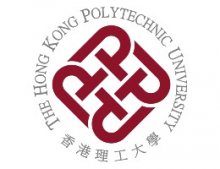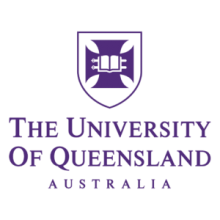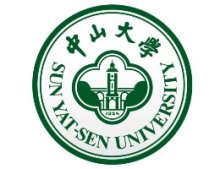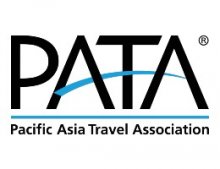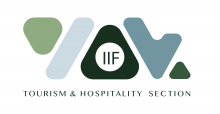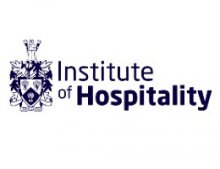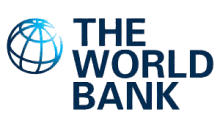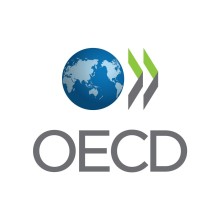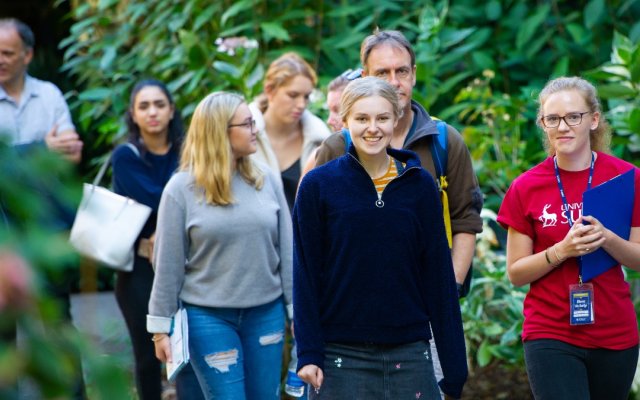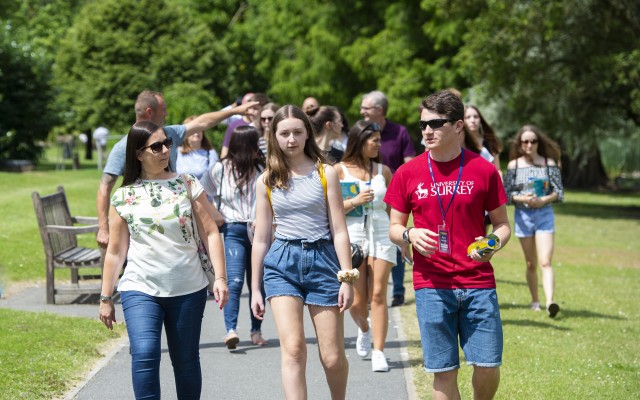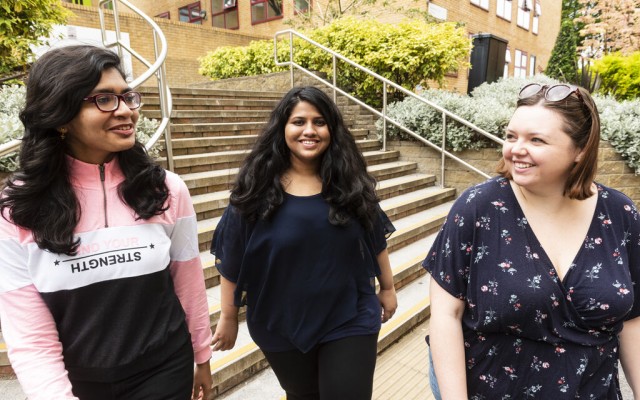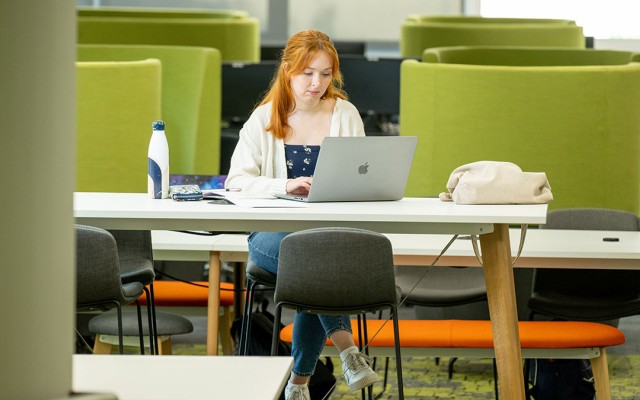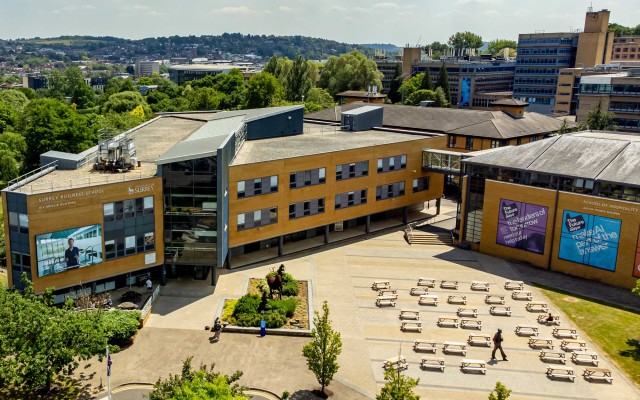

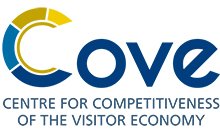
Centre for Competitiveness of the Visitor Economy
We are addressing competitiveness issues in the visitor economy across firm, sector and destination levels.
Spotlight on our research
Our research has great impact, and we are proud to highlight our achievements through a series of short films, told by our research authors.

Research aims
We aim to address equality and diversity in employment and conduct studies of future labour markets, productivity, career mobilities, skills, flexible employment and entrepreneurial migration, while examining other aspects of competitiveness at both firm and destination levels, such as advances in destination branding, visitor satisfaction, innovation, revenue management, and risk and disaster impacts.
We also aim to maintain our world-leading position in demand-forecasting research, which provides a scientific foundation to support businesses’ and governments’ decision making to improve their competitiveness.
Research themes
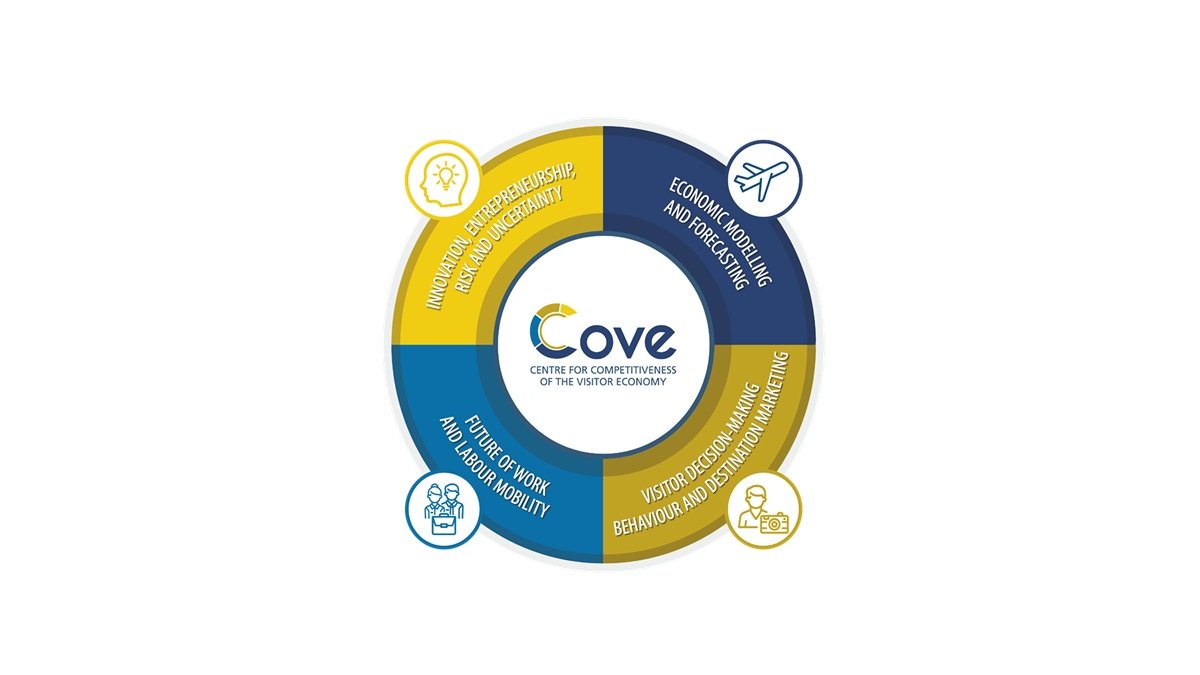
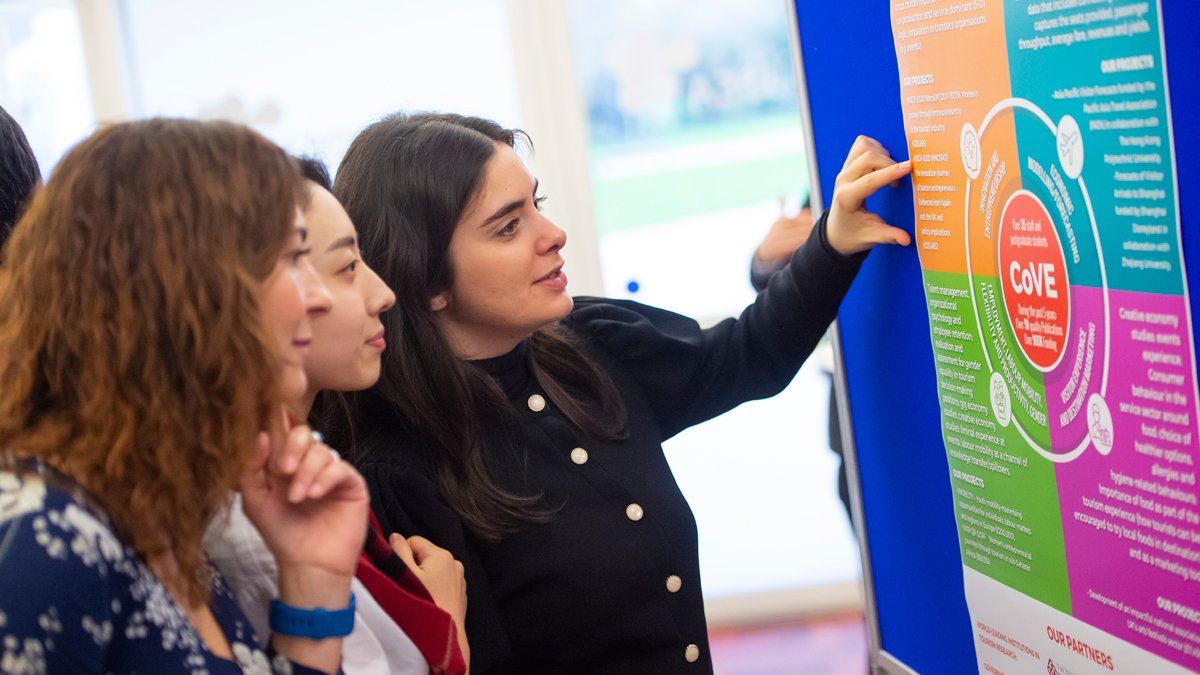
Economic modelling and forecasting
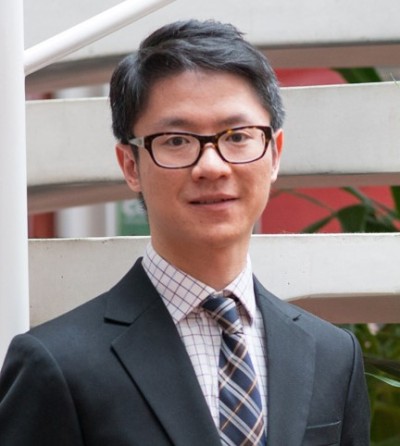
Research theme lead: Dr Jason Chen
This research theme focuses on developing and applying cutting-edge methods in economic analysis and forecasting in the context of tourism, hospitality, transport and events. Members of this theme work on a wide range of areas such as tourism demand, economic impact of the Visitor Economy, firm performance, productivity and tourism competitiveness while pushing the boundaries of econometric, time series and spatial economic modelling and forecasting techniques.
Innovation, entrepreneurship, risk and uncertainty

Research theme lead: Professor Allan Williams
Innovation and entrepreneurship are at the core of this theme. Research on innovation focusses on the process of innovation in the firm, paying particular attention to knowledge and uncertainty, but also addressing the role of innovation in policy areas such as sustainability as well as in academia. Innovation research is strongly linked to investigations of entrepreneurship in the public, private, and third sectors, with gender and migration being important lines of research. Investigations of risk and uncertainty also extend beyond the firm to the analysis of consumer preferences and behaviour.
Future of work and labour mobility

Research theme lead: Dr Tracy Xu
Future of work and labour mobilities are at the core of this theme. Members of this theme investigate labour productivity and wellbeing, migration, gender issues, and technology-enhanced employability of future workforce in the visitor economy. This theme supports research on how work in the visitor economy is changing, the internal and external forces that support the change, and their implications on organisational performance, employee wellbeing and dignity.
Visitor decision-making, behaviour and destination marketing

Research theme lead: Dr Marion Karl
This theme of research focuses on the consumer behaviour side of competitiveness. Research from this theme includes topics such as tourists’ and visitors’ decision-making, tourism experiences, destination choice and influencing factors, tourist and visitor behaviour, or visitor attraction and destination marketing as well as management.

Covid-19 research in hospitality and tourism
Our research aims to understand the needs and requirements of businesses and travellers to be able to return to a new normality when it comes to travelling and the prosperity of businesses.
Research projects
Life after-death: knowledge trajectories after innovation failure
Principal investigator: Dr Isabel Rodríguez
Start date:
End date:
Principal investigator: Eden Xiaoying Jiao
Start date: January 2023
End date: December 2024
A conversation about menopause: supporting women's wellbeing in the workplace
Principal investigator: Dr Tracy Xu
Start date: November 2022
End date: November 2022
Co-creating equitable, diverse and inclusive travel and tourism (CrEDIT)
Principal investigator: Dr Bora Kim
Start date: August 2022
End date: March 2023
Digital employee management interfaces
Principal investigator: Dr Tracy Xu
Start date: May 2022
End date: July 2022
Exploring the barriers to co-creating diverse and inclusive travel experiences for BAME tourists
Principal investigator: Dr Yoo Ri Kim
Start date: February 2022
End date: July 2022
The effects of social media bragging on employees at workplace
Principal investigator: Dr Hongbo (Daisy) Liu
Start date: September 2021
End date: September 2022
Engaging new travel audiences: understanding the Black travellers’ decision-making process
Principal investigator: Dr Albert Kimbu
Start date: May 2021
End date: September 2021
Tourism recovery, risk and uncertainty
Principal investigator: Professor Allan Williams
Start date: March 2021
End date: August 2021
Start date: March 2021
End date: November 2021
Understanding the landscape of inbound tourism measurement
Principal investigator: Dr Jason Chen
Start date:
End date:
Social and economic impacts of arts in Surrey
Principal investigator: Professor Gang Li
Start date:
End date:
Review of evidence of elasticities relevant to tourism in Scotland
Principal investigator: Dr Jason Chen
Start date:
End date:
Principal investigator: Jin Soo Lee
Start date: January 2020
End date: December 2021
General-to-specific modelling with Bayesian bootstrap aggregation in tourism demand
Principal investigator: Professor Haiyan Song
Start date: September 2019
End date: August 2022
Towards an impactful national association for UK's arts festivals sector
Principal investigators: Dr Shi (Tracy) Xu, Dr Yanning Li
Start date: May 2019
End date: July 2019
Women's entrepreneurial journeys through tourism in sub-Saharan Africa
Principal investigator: Dr Albert Kimbu
Start date: January 2019
End date: September 2019
Women's journey through innovation in the tourism industry
Principal investigators: Dr Cristina Figueroa Domecq, Professor Allan Williams
Start date: September 2018
End date: August 2020
Marketing capability of Chinese exhibitors in overseas countries
Principal investigator: Jingna Wang
Start date: July 2018
End date: July 2021
Creating the tourist satisfaction index of China inbound tourism from Britain
Start date:
End date:
Socio-economic impact of Clean Sky 1
Start date: 2016
End date: 2017
Visitor forecasting for Shanghai Disney Resort: impact on Disney’s pricing strategy
Start date: 2015
End date: 2015
Cross-border regional innovation system integration
Principal investigators: Dr Teemu Makkonen, Professor Allan Williams
Start date: 2014
End date: 2016
Labour productivity, work flexibility, and international migration in hotels
Principal investigators: Professor Allan Williams, Professor Andrew Lockwood, Sangwon Park
Start date: August 2013
End date: March 2015
Destination branding: tourism and events in northern regions
Start date: 2013
End date: 2016
Key factors for SME competitiveness in the context of globalisation
Start date: 2013
End date: 2015
Visitor forecasts of the Asia-Pacific region
Principal investigator: Professor Haiyan Song
Start date: December 2012
End date: Ongoing
Principal investigators: Professor Allan Williams, Dr Isabel Rodriguez
Start date: June 0016
End date: May 2018
Principal investigators: Professor Allan Williams, Professor Gang Li, Hania Janta
Start date: March 0014
End date: March 2018
(Re)engaging with sport fans post-Covid
Principal investigators: Dr Yanning Li, Dr Bora Kim, Dr Shi (Tracy) Xu
Consumer purchasing intention in restaurants and hotels post-Covid-19 lockdown
Principal investigators: Dr Yoo Ri Kim, Dr Anyu Liu
Covid-19 impact on the Chinese air transport markets
Principal investigator: Dr Frankie O'Connell
Innovative pricing: Pay-as-you-wish as a means to attract customers to museums post Covid-19
Principal investigators: Dr Brigitte Stangl, Dr Margit Kastner
Service design and information provision requirements based on proxemics
Principal investigators: Dr Brigitte Stangl, Owen Grainger-Jones, Dr Margit Kastner
Spatial disparities in SME productivity: evidence from the service sectors in England
Principal investigators: Dr Tiwasing Tiwasing, Dr Yoo Ri Kim, Katiuscia Lavoratori, Temitope Akinremi, Diletta Pegoraro
Publications
| Gang Li, Marion Karl | 2025 | EXPRESS: Advancing Behavioral Economics Research in Tourism and Hospitality: New Theoretical and Methodological Perspectives | Journal of hospitality & tourism research | DOI: 10.1177/10963480251362794 | |
| Xiaoying Jiao, Li Chen, Gang Li, Tongxiang Liu | 2025 | From tourism demand to destination competitiveness: A spatial spillover perspective | Tourism management | 111,105,225 | DOI: 10.1016/j.tourman.2025.105236 |
| Bowen Yi, Da Shi, Gang Li | 2025 | Real Me or Digital Me? Consumers’ Consumption Responses to Online Avatars | International journal of hospitality management | 132,104,394 | DOI: 10.1016/j.ijhm.2025.104394 |
| Gilang Maulana Majid, Iis Patimah Tussyadiah, Yoo Ri Kim, Li Chen | 2025 | From Destination to Daily Life: A Longitudinal Study on the Effects of Flashback Nudging on Pro-environmental Behavior Spillover | Journal of travel research | DOI: 10.1177/00472875251337777 | |
| Elisabeth Bartl, Maximilian Weigert, Alexander Bauer, J Schmude, Marion Susanne Karl, Helmut Kuechenhoff | 2025 | Understanding travel behaviour patterns and their dynamics: Applying fuzzy clustering and age-period-cohort analysis on long- term data of German travellers | European journal of tourism research | 393,862 | DOI: 10.54055/ejtr.v39i.3862 |
| Salehi, M., Filimonau, V., Lin, M.S., Kim, B., & Lin, P. M. C | 2025 | Exploring sustainable healthy food consumption in self-catering holidays | Journal of Travel Research | https://doi.org/10.1177/00472875251370719 | |
| Nyugen, N.T., Kim, B., & Song, H. | 2025 | The Dynamics of Sustainability: CEO Celebrity as a Moderator on the ESG and Firm Performance Relationship in the Restaurant Industry | International Journal of Hospitality Management | https://doi.org/10.1016/j.ijhm.2025.104353 | |
| Hong, S., O’Connell, J.F., Kim, B*., & Cho, J. | 2025 | Impact of relative price on airline revenues | Annals of Tourism Research. | https://doi.org/10.1016/j.annals.2025.103978 | |
| Albert Nsom Kimbu, Claudia Eckhardt | 2025 | Exploring Sustainability Transitions in E-Volunteer Tourism: Unpacking the Resilience-Sustainability Nexus | Tourism planning & development | 1,21 | DOI: 10.1080/21568316.2025.2591196 |
| Siamak Seyfi, Albert Nsom Kimbu, Tan Vo-Thanh, Mustafeed Zaman | 2025 | Tourism, consent, and resistance: A Gramscian lens | Annals of tourism research | 115,104,056 | DOI: 10.1016/j.annals.2025.104056 |
| Albert Nsom Kimbu, Michael Z. Ngoasong, Ogechi Adeola | 2025 | Typologies of Entrepreneurial Innovations in Small and Medium Tourism Enterprises in Resource-Scarce Destinations Abstract | African journal of hospitality, tourism and leisure | 784-794 | DOI: 10.46222/ajhtl.19770720.662 |
| Issahaku Adam, Albert Nsom Kimbu, Ewoenam Afua Afenyo-Agbe, Tembi Tichaawa, Ogechi Adeola | 2025 | Journal of Sustainable Tourism 'Sometimes it's as if I don't exist': workplace inclusion of employees with disability in emerging destinations 'Sometimes it's as if I don't exist': workplace inclusion of employees with disability in emerging destinations | Journal of Sustainable Tourism | DOI: 10.1080/09669582.2025.2539287 | |
| Frederick Dayour, Albert Nsom Kimbu, Ewoenam Afua Afenyo-Agbe | 2025 | Tourism Planning & Development "Women can withstand climate change's stressors": The Role of Community-based Ecotourism for Climate Resilience and Mitigation in Semi-arid Ghana | Tourism Planning & Development | DOI: 10.1080/21568316.2025.2507615 | |
| Bob Yi-Chen Duan, Jingjing Dai, Yuetian Zhang, Emily Ma, Jintao Ma | 2025 | Tourism Diplomacy Co-creates and Reshapes Perceptions in Tourist-Host Relationship | Tourism: An International Interdisciplinary Journal | DOI: 10.37741/t.73.3.7 | |
| Eunbi Jo, Aaron Hsiao, Emily (Jintao) Ma, Sacha Reid | 2025 | Status of Urban Sharing Research: Contexts, Methods, Theories and Future Research Agendas | The international journal of tourism research | DOI: 10.1002/jtr.70033 | |
| Xing'an Xu, Shijia Wang, Juan Liu, Xuan Lorna Wang, Nigel Morgan | 2025 | How does the cuteness of persuasive communication about sustainable tourism shape tourists' environmentally responsible behavioral intentions? | Journal of sustainable tourism | DOI: 10.1080/09669582.2025.2478187 | |
| Gareth Shaw, Allan M. Williams | 2025 | Knowledge transfer and knowledge management in tourism organisations: A widening and deepening research agenda | Tourism Management | DOI: 10.1016/j.tourman.2024.105121 | |
| Zhang, Q., Chen, J. L., Li, G., & Jiao, X. | 2025 | Digital transformation and tourism performance: A systematic literature review and research agenda | Tourism Economics | 13,548,166,251,383,100 | |
Yi, B., Shi, D., & Li, G. (2025, April 22). Seeing is believing: Impacts of visual cues on social interaction and popularity of shared accommodation. Current Issues in Tourism. Advance online publication. https://doi.org/10.1080/13683500.2025.2493742
Zhang, K., Sun, X., & Li, G. (2025). Virtual influencer and cultural heritage destination: Endorsement effectiveness of virtual versus human influencers. Annals of Tourism Research, 110(3), Article 103873. https://doi.org/10.1016/j.annals.2024.103873
Jiang, Y., Fu, Q., Thomopoulos, N., & Chen, J. L. (2025). Understanding the influence of past driving experience on electric vehicle purchase intention in China. Transport Policy, 162, 270–282. https://doi.org/10.1016/j.tranpol.2024.11.025
Liu, X., Liu, A., Chen, J. L., Li, G., & Song, H. (2025, January). Tourism demand forecasting in normal and crisis times: Combining bootstrap‑aggregating and Bayesian approaches. Journal of Hospitality & Tourism Research. Advance online publication. https://doi.org/10.1177/10963480251313492
Bartl, E., Weigert, M., Bauer, A., Schmude, J., Karl, M., & Küchenhoff, H. (2025, January 15). Understanding travel behaviour patterns and their dynamics: Applying fuzzy clustering and age‑period‑cohort analysis on long‑term data of German travellers. European Journal of Tourism Research, 39, Article 3914. https://doi.org/10.54055/ejtr.v39i.3862
Xu, X., Wang, X. L., & Kim, B. (2025, March). Exploring the value co‑creation mechanism in online travel communities: Value co‑creators, engagement activities, and interactions. Journal of Travel Research. Advance online publication. https://doi.org/10.1177/00472875251322515
Eves, A., Timotijevic, L., Kim, B., Hodgkins, C., & Raats, M. (2025). Is it food or is it waste? Determinants of decisions to throw food away. Sustainable Production and Consumption, 54, 43–51. https://doi.org/10.1016/j.spc.2024.12.016
Yeon, J., Song, H. J., & Kim, B. (2025). Moral imperative or economic necessity? The role of institutional investors in the corporate social responsibility—financial performance relationship. Sustainability, 17(2), Article 582. https://doi.org/10.3390/su17020582
Kim, B., Liu, A., & Ling, E. C. L. (2025). Effects of disability employment on guest perceptions and behavioral intentions in the hotel sector. International Journal of Hospitality Management, 124, Article 103993. https://doi.org/10.1016/j.ijhm.2024.103993
Vernes, W. E., Zhang, W., Kimbu, A. N., & Hanna, P. (2025). Plus size people can and will travel too: body positivity in travel and leisure. Journal of Sustainable Tourism, 1-27.
Ribeiro, M. A., Adam, I., Kimbu, A. N., Dayour, F., Adeola, O., & Tichaawa, T. M. (2025). Resilience in uncertainty: The impact of coping strategies on tourism entrepreneurs’ subjective well-being in sub-Saharan Africa. Tourism management, 110, 105169.
Seyfi, S., Kimbu, A. N., Tavangar, M., Vo-Thanh, T., & Zaman, M. (2025). Surviving crisis: Building tourism entrepreneurial resilience as a woman in a sanctions-ravaged destination. Tourism Management, 106, 105025.
Seo, I. T., Liu, H., Li, H., & Lee, J. S. (2025, March). AI‑infused video marketing: Exploring the influence of AI‑generated tourism videos on tourist decision‑making. Tourism Management, 110, Article 105182. https://doi.org/10.1016/j.tourman.2025.105182
Luo, Z., Wang, L., & Liu, H. (2025, March). Influencer marketing and destination visit intention: The interplay between influencer type, information format, and picture color hue. Journal of Travel Research. Advance online publication. https://doi.org/10.1177/00472875251322514
Sun, P., Lyu, M., & Liu, H. (2025, February 20). Can talented tour guides truly not be retained? Exploring the development of tour guides’ career resilience under stressful conditions. Tourism Management. Advance online publication. https://doi.org/10.1016/j.tourman.2025.105157
Wang, Y.-C., Zhang, Y., Ma, E., Ma, E. (J.), Zhang, L., Zhang, Y., Huan, N., Huang, J., Huang, J., & Pan, S.-Y. (2025, July). AI‑assisted cross‑cultural training for hotel newcomers: An IT mindfulness‑driven perspective on building cultural intelligence and career development confidence. International Journal of Hospitality Management, 128, Article 104186. https://doi.org/10.1016/j.ijhm.2025.104186
Liu, J., Ma, E., Zhong, W., & Hu, B. (2025, April). Going above and beyond for your own sake? An integrated model of hotel employees’ OCB, workplace thriving, and perceived control. International Journal of Hospitality Management, 128, Article 104169. https://doi.org/10.1016/j.ijhm.2025.104169
Yang, H., Song, H., Wang, Y.-C., & Ma, E. (2025). Similarity‑attraction theory perspective on service employees and service robots’ interactions. Service Industries Journal. Advance online publication. https://doi.org/10.1080/02642069.2025.2485972
Wang, Y. C., Song, H., Yang, H., & Ma, E. (2025). Robots vs. human employees’ influence on restaurant brand relationship building: An integration of role theory and stereotype theory. Journal of Vacation Marketing, 13567667251317736.
Gao, J., Zhang, Y., Xu, S., & Ma, E. (2025). Rethinking work-life integration: empowering talent in emerging hospitality and tourism work paradigms. International Journal of Contemporary Hospitality Management.
Anuar, M. D. D. B. M., Itani, N., O'Connell, J. F., & Warnock-Smith, D. (2025). Investigating the impacts of ASEAN-EU comprehensive air transport agreement on the carriers’ competitive dynamics. Journal of Air Transport Management, 124, 102739.
Xia, H., Muskat, B., Karl, M., Li, Q., & Li, G. (2025). Destination Competitiveness Improvement: Insights From Causal Counterfactual AI Analysis. Journal of Travel Research, 00472875251322512.
Stangl, B., Kastner, M., & Natter, M. (2025). The Impact of Cost Structure Appeals on Fairness Perceptions and Payments. Journal of Service Research, 10946705251341080.
Majid, G. M., Tussyadiah, I., Kim, Y. R., & Chen, J. L. (2025). From Destination to Daily Life: A Longitudinal Study on the Effects of Flashback Nudging on Pro-environmental Behavior Spillover. Journal of Travel Research, 00472875251337777.
Duan, B. Y.-C., Zhang, Y., Dai, J., & Ma, E. (2025, April 5). Identity deconstruction through pilgrimage in Lhasa. In M. Valeri (Ed.), Contemporary Religious Tourism (pp. 287–298). Springer, Cham. https://doi.org/10.1007/978-3-031-79074-4_18
Duan, B. Y.-C., Zhang, Y., Dai, J., & Ma, E. (2025). Emotional intelligence and customer satisfaction: A comparison between guesthouses and hotels. In Contributions to Management Science: Emotional Intelligence and Networking Competencies (pp. 113–126). Springer Nature. https://doi.org/10.1007/978-3-031-77543-7_8
Cai, Y., Li, G., Wen, L., & Liu, C. (2024). Intellectual landscape and emerging trends of big data research in hospitality and tourism: A scientometric analysis. International Journal of Hospitality Management, 117, Article 103633. https://doi.org/10.1016/j.ijhm.2023.103633
Gatersleben, B., White, E., Wyles, K., Golding, S.E., Murrell,G., Scarles, C., Xu, S., Brockett, B., Willis, C. (2024). Everyday places to get away–Lessons learned from Covid-19 lockdowns. Landscape and urban planning, 246, 105026.
Zhang, K., Hou, Y., & Li, G. (2024). Color and naturalness: How color saturation shapes tourists’ perception and purchase intention. International Journal of Tourism Research, 26(4), Article e2717. https://doi.org/10.1002/jtr.2717
Hoy, L. S., Stangl, B., & Morgan, N. (2024). Leisure with dogs in the UK: The importance of shared outdoor leisure spaces highlighted by the COVID‑19 pandemic. Leisure/Loisir. Advance online publication. https://doi.org/10.1080/14927713.2024.2308919 surrey.ac.uk+7tandfonline.com+7scispace.com+7
Hu, C., Hu, X., & Liu, H. (2024). Making friends with tourists before the tour: A study of guide‑tourist pre‑tour interactions based on the social situation framework. Journal of Tourism Research, 26(4), Article e2704. https://doi.org/10.1002/jtr.2704 researchgate.net+6onlinelibrary.wiley.com+6scholar.google.de+6
Hu, R., Li, G., Liu, A., & Chen, J. L. (2024). Emerging research trends on residents’ quality of life in the context of tourism development. Journal of Hospitality & Tourism Research, 48(1), 131–152. https://doi.org/10.1177/10963480221081382 openresearch.surrey.ac.uk+4research.polyu.edu.hk+4researchgate.net+4
Hui, T. H., Itani, N., & O’Connell, J. F. (2024). Examining air travellers’ willingness to pay for non‑voluntary environment‑related fees: The case of SAF surcharge and carbon taxes. Highlights of Sustainability, 3(1), 61–75. https://doi.org/10.54175/hsustain3010005
Li, H., Liu, H., Shin, H. S., & Ji, H. P. (2024). Impacts of user‑generated images in online reviews on customer engagement: A panel data analysis. Tourism Management, 101, 104855. https://doi.org/10.1016/j.tourman.2023.104855
Liu, X., Liu, A., Jiao, X., & Liu, Z. (2024). The impact of policy intervention on international wine demand. International Journal of Contemporary Hospitality Management, 36(8), 2728-2751.
Ma, E., Baker, M. A., Kim, Y. S., & Kim, K. (2024). When going above and beyond meets diversity: Are service recoveries evaluated based on inference or recognition? Cornell Hospitality Quarterly, 65(2). https://doi.org/10.1177/19389655231214708
Shan, Y., Shi, D., & Xu, S. (2024). Do imprinting effects on CEOs affect tourism and hospitality enterprises’ corporate innovation? International Journal of Contemporary Hospitality Management, 36(10), 3515–3533. https://doi.org/10.1108/IJCHM-05-2023-0707
Williams, A. M., & Rodríguez Sánchez, I. (2024). Knowledge mobility after tourism entrepreneurial failure: Life after death? Annals of Tourism Research, 106, Article 103767. https://doi.org/10.1016/j.annals.2024.103767
Yang, W., & Xu, S. (2023). Should we be more mindful? The joint impact of an abusive work environment and mindfulness on employee well-being and turnover intentions. Journal of Hospitality & Tourism Research, 48(4), 712–724. https://doi.org/10.1177/10963480231156832
Yi, B., Shi, D., & Li, G. (2024). What makes an AI‑themed hotel successful? New evidence from a sequential research design. International Journal of Contemporary Hospitality Management, 37(3), 783–804. https://doi.org/10.1108/IJCHM-05-2024-0743
Li, H., Cai, D., Li, G., & Hu, M. (2025). The “Beauty Premium” phenomenon: Appearance discrimination in the P2P market. Journal of Travel Research, 64(4), 783–811. https://doi.org/10.1177/00472875241227611
Lin, G., Chen, J. L., & Song, H. (2024). The heterogeneity of hotel demand curves across consumers and contexts. Journal of Hospitality & Tourism Research. Advance online publication. https://doi.org/10.1177/10963480241271307
Majid, G. M., Tussyadiah, I., Kim, Y. R., & Chen, J. L. (2024). Promoting pro‑environmental behaviour spillover through chatbots. Journal of Sustainable Tourism, 1–19. https://doi.org/10.1080/09669582.2024.2393256
Jiao, X., Li, G., Qiu, R. T. R., & Chen, J. L. (2024, May). Analyzing destination resilience from a spatiotemporal perspective. Journal of Travel Research, 63(5), 1186–1205. https://doi.org/10.1177/00472875241245048
Lin, G., Chen, J. L., Li, G., & Song, H. (2024). Substitution between sharing accommodation and hotels: A behavioral economic demand curve analysis. Annals of Tourism Research, 104, Article 103716. https://doi.org/10.1016/j.annals.2023.103716
Voss, S., André, H., Kock, F., Karl, M., & Josiassen, A. (2024, December 23). Guiding pro‑environmental behaviour: Examining the impact of cognitive and behavioural interventions on sustainable food choices in hospitality. Journal of Sustainable Tourism. Advance online publication. https://doi.org/10.1080/09669582.2024.2439983
Bartl, E., Bauer, A., Weigert, M., Karl, M. S., Schmude, J., & Küchenhoff, H. (2024). Disentangling temporal changes in travel behavior: An age-period-cohort analysis based on German travel demand. Annals of Tourism Research Empirical Insights, 5(2), Article 100155. https://doi.org/10.1016/j.annale.2024.100155
Xia, H., Muskat, B., Karl, M., Li, G., & Law, R. (2024, April). Destination competitiveness research over the past three decades: A computational literature review using topic modelling. Journal of Travel & Tourism Marketing. Advance online publication. https://doi.org/10.1080/10548408.2024.2332278
Salehi, M., Lin, M. S., Filimonau, V., Kim, B., & Lin, P. M. C. (2024). How to advance sustainable healthy food consumption in tourism: A systematic literature review. Journal of Sustainable Tourism. Advance online publication. https://doi.org/10.1080/09669582.2024.2431845
Park, S., Kim, B., & Song, S. (2024). Generalist vs. specialist CEOs: Towards an understanding of CSR scheme in the restaurant industry. International Journal of Hospitality Management, 110, Article 103797. https://doi.org/10.1016/j.ijhm.2024.103797
Kim, B., & Lee, S. (2024). Restaurant celebrity chief executive officer and risk-taking: The moderating role of chief executive officer origin and franchising. Tourism Economics. Advance online publication. https://doi.org/10.1177/13548166241264595
Muharam, I. N., Tussyadiah, I., & Kimbu, A. (2024, August). Unlocking the potential of blockchain-based sharing economy in hospitality and tourism: A systematic review. International Journal of Hospitality Management, 122, Article 103863. https://doi.org/10.1016/j.ijhm.2024.103863
Ibrahim, M. N., Ribeiro, M. A., & Kimbu, A. N. (2024). Redirecting Slack Resources to Social and Environmental Issues: A Cross‑Cultural Analysis of Tourism Firms Post‑Crisis. Journal of Travel Research. Advance online publication. https://doi.org/10.1177/00472875241260333
Muharam, I. N., Tussyadiah, I. P., & Kimbu, A. N. (2024). Decentralising Airbnb: Testing the acceptability of blockchain-based sharing economy systems. Tourism Management, 102, Article 104871. https://doi.org/10.1016/j.tourman.2023.104871
Kim, Y. R., Kimbu, A. N., Ramakrishnan, S., & Saha, P. (2024). Understanding the travel decision‑making behaviors of ethnic minority tourists: The moderating role of psychological empowerment. Journal of Travel Research, 63(5), 1064–1084. https://doi.org/10.1177/00472875241245407
Kimbu, A. N., Ngoasong, M. Z., & de Jong, A. (2024). Gender, entrepreneurship and social policy in tourism: Tying the knot. Journal of Sustainable Tourism, 32(3), 421–437. https://doi.org/10.1080/09669582.2024.2309216
Xu, S. (Shi You), Ashton, M., Li, Y. (Yanning), Staunton, G., & Li, Y. (Kevin). (2024, September 6). Hotel employee engagement during the pandemic: A mixed-method approach. Cornell Hospitality Quarterly. Advance online publication. https://doi.org/10.1177/19389655241276511
Hu, C., Hu, X., & Liu, H. (2024, July). Making friends with tourists before the group tour: A study of guide–tourist pre‑tour interactions based on the social situation framework. International Journal of Tourism Research. Advance online publication. https://doi.org/10.1002/jtr.2704
Liu‑Lastres, B., Guo, Y., & Liu, H. (2022). Hotel crisis communication on social media: Effects of message appeal. Anatolia, 35(1), 56–66. https://doi.org/10.1080/13032917.2022.2119590
Wang, Y.-C., Xu, F., Xu, S. (Tracy), & Ma, E. (2024). Utilize OCB‑C‑driven learning mechanism to empower employees as good citizens: Perspective of trial‑and‑error learning theory. Cornell Hospitality Quarterly. Advance online publication. https://doi.org/10.1177/19389655241256535
Yang, H.-J., Zhao, X., & Ma, E. (2024). A dual‑path model of work–family conflict and hospitality employees’ job and life satisfaction. Journal of Hospitality and Tourism Management. Advance online publication. https://doi.org/10.1016/j.jhtm.2023.12.008
Yang, H., Wang, Y.-C., Song, H., & Ma, E. (2024). Utilitarian vs hedonic roles of service robots and customer stereotypes: A person–environment fit theory perspective. International Journal of Contemporary Hospitality Management, 36(5), 3211–3231. https://doi.org/10.1108/IJCHM-05-2023-0668
Yang, H., Wang, Y.-C., Song, H., & Ma, E. (2024). Utilitarian vs hedonic roles of service robots and customer stereotypes: A person–environment fit theory perspective. International Journal of Contemporary Hospitality Management, 36(5), 3211–3231. https://doi.org/10.1108/IJCHM-05-2023-0668
Meng, L., Li, D., Ma, E., & Du, J. (2024). How family motivation affects Chinese hotel employees’ extra-role behaviors: A serial mediation model from an instrumental perspective. International Journal of Hospitality Management, 116, Article 103625. https://doi.org/10.1016/j.ijhm.2023.103625
Wang, D., Ma, E., & Leung, X. Y. (2024). Working with robots: a job design perspective of hospitality employees’ collaboration intentions with service robots. Journal of Hospitality and Tourism Management, 61, 66-77.
Hu, J., Zhu, Y., Ma, E., & Chen, C. (2024, July). How do you treat your “big fish”? The joint effect of perceived subordinates’ overqualification and managers’ personalities on knowledge hiding. Service Industries Journal. Advance online publication. https://doi.org/10.1080/02642069.2024.2381813
Manfreda, A., Wang, D., Zhang, Y., & Ma, E. (2024). Unraveling women (in) leadership in tourism and hospitality: a retrospect and outlook. The Service Industries Journal, 1-28.
Song, H., Zeng, W., Chen, J. M., & Ma, E. (2024). COVID-19 Impacts on the Spatial Network of City Tourism in Fujian Province, China. Sustainability, 16(8), 3162.
Yang, H., Delahaye, D., O’Connell, J. F., & Le, M. (2024, November). Enhancing airline connectivity: An optimisation approach for flight scheduling in multi‑hub networks with bank structures. Transportation Research Part E: Logistics and Transportation Review, 191, Article 103715. https://doi.org/10.1016/j.tre.2024.103715
Mr, T. H. H., & O'Connell, J. F. (2024). Examining Air Travellers' Willingness to Pay for Non-voluntary Environment-related Fees: The Case of SAF Surcharge and Carbon Taxes. Highlights of Sustainability, 3(31), 61.
Stangl, B., Li, Y., Ma, E., Xu, S., & Alsaied, M. (2024). Transferable skills in tourism and hospitality. Annals of Tourism Research, 109, Article 103854. https://doi.org/10.1016/j.annals.2024.103854
Chen, J. L., Baláž, V., Li, G., & Williams, A. M. (2025, January 21). Tourist decision‑making and types of crises: Risk attitudes, knowledge, and destination preference persistence. Journal of Hospitality & Tourism Research. Advance online publication. https://doi.org/10.1177/10963480241310819
Williams, A. M., & Rodríguez Sánchez, I. (2024). Knowledge mobility after tourism entrepreneurial failure: Life after death? Annals of Tourism Research, 106, Article 103767. https://doi.org/10.1016/j.annals.2024.103767
Makkonen, T., & Williams, A. M. (2024, February). Cross-border tourism and innovation system failures. Annals of Tourism Research, 105, Article 103735. https://doi.org/10.1016/j.annals.2024.103735 arxiv.org+12researchgate.net+12sciencedirect.com+12
Baláž, V., Chen, J. L., Williams, A. M., & Li, G. (2024, March). Stability of risk and uncertainty preferences in tourism. Annals of Tourism Research, 105, Article 103726. https://doi.org/10.1016/j.annals.2024.103726
Shan, Y., Shi, D., & Xu, S. (2024). Do imprinting effects on CEOs affect tourism and hospitality enterprises’ corporate innovation? International Journal of Contemporary Hospitality Management, 36(10), 3515–3533. https://doi.org/10.1108/IJCHM-05-2023-0707
Kim, B. (2024). Enhancing social inclusion: Exploring the potential of employing people with disabilities (PWDs) in hospitality and tourism: ESRC Festival of Social Science – Post‑Event Report [Post-event report]. University of Surrey. https://doi.org/10.15126/900985
Swart, M. P. N., Cai, W., Yang, E. C. L., & Kimbu, A. N. (Eds.). (2024). Routledge Handbook on Gender in Tourism: Views on Teaching, Research and Praxis (1st ed., 332 pp.). Routledge. https://doi.org/10.4324/9781003286721
Anna de Jong, A., Ngoasong, M. Z., & Kimbu, A. N. (2024). Gender, tourism entrepreneurship and social policy. Routledge. https://doi.org/10.4324/9781003315858
Song, H., Zeng, W., Chen, J. M., & Ma, E. (2024). COVID-19 Impacts on the Sustainable Development of Spatial Network of UrbanTourism—a Case Study of Fujian, China.
Senevirathna, L., Jin, X., & Ma, E. (2024, February). The role of psychological empowerment in promoting volunteer satisfaction. In CAUTHE 2024 Conference Proceedings: Diverse Voices: Creating Change in Tourism, Hospitality and Events (pp. 353-353). Hobart: Council for Australian University Tourism and Hospitality Education.
Duan, B. Y. C., Dai, J., & Ma, E. (2024). Identifying Wellness Value Formation in Young Wine Tourists: A grounded theory approach. In Innovation Strategies and Organizational Culture in Tourism (pp. 45-60). Routledge.
Xia, H., Muskat, B., Karl, M., & Li, G. (2024). Destination competitiveness and AI‑based methods. In M. Pillmayer, M. Karl, & M. Hansen (Eds.), Tourism destination development: A geographic perspective on destination management and tourist demand (pp. 33–54). Berlin and Boston: De Gruyter. https://doi.org/10.1515/9783110794090-003
Pillmayer, M., Hansen, M., & Karl, M. (2024). The contribution of academia to destination development: Why do we need a book on destination development? In M. Pillmayer, M. Karl, & M. Hansen (Eds.), Tourism Destination Development: A Geographic Perspective on Destination Management and Tourist Demand (pp. 473–482). Berlin; Boston: De Gruyter. https://doi.org/10.1515/9783110794090-022
Pillmayer, M., Hansen, M., & Karl, M. (2024). The Contribution of Academia to Destination Development. Tourism Destination Development: A Geographic Perspective on Destination Management and Tourist Demand, 11, 473.
Pillmayer, M., Karl, M., & Hansen, M. (2024). The Need to Engage with Destination Development. Tourism Destination Development: A Geographic Perspective on Destination Management and Tourist Demand, 11, 1.
Pillmayer, M., Karl, M., & Hansen, M. (Eds.). (2024). Tourism destination development: A geographic perspective on destination management and tourist demand. De Gruyter. https://doi.org/10.1515/9783110794090
Duan, B. Y.‑C., Dai, J., & Ma, E. (2024). Identifying wellness value formation in young wine tourists: A grounded theory approach. In M. Valeri (Ed.), Innovation strategies and organizational culture in tourism (pp. 75–92). De Gruyter. https://doi.org/10.4324/9781032633374-5
Adam, I., Dayour, F., & Kimbu, A. N. (2023). Crisis-induced financial anxiety, social support, socio-psychological wellbeing, and commitment to work in the tourism sector. Development Southern Africa, 1–24. https://doi.org/10.1080/0376835x.2023.2165042
Choi, S., Yeon, J., Hyoung Ju Song, & Hu, J. (2023). Information technology as a buffer against COVID-19. Annals of Tourism Research, 98, 103527–103527. https://doi.org/10.1016/j.annals.2022.103527
Duan, B., Dai, J., & Ma, E. (2023). Winter Sports Mega-Event Destination Experience: An Experience Economy Model Perspective During the Post-COVID-19 Pandemic. Sport and Tourism (New Perspectives in Tourism and Hospitality Management), Emerald Publishing Limited, Bingley, pp. 79-94. https://doi.org/10.1108/978-1-83753-240-720231005
Duan, B., Ma, E., & Arcordia, C. (2023) Conceptualising the Health-related Values Within Wine Tourism. Journal of Vocation Marketing. https://doi.org/10.1177/13567667231192788
Foong, J. J., O’Connell, J. F., Warnock-Smith, D., & Efthymiou, M. (2023). A product and organisational architecture analysis of the performance of Southeast Asian airlines. Journal of Air Transport Management, 107, 102358. https://doi.org/10.1016/j.jairtraman.2023.102358
Graham, A., Warnock-Smith, D., O’Connell, J. F., Efthymiou, M., & Zheng, X. (2023). Market Developments on Chinese International Air Passenger Markets in Light of COVID-19 Policy Measures. Sustainability, 15(2), 1525. https://doi.org/10.3390/su15021525
Hakan Sezerel, Viachaslau Filimonau, Ashton, M., & Xu, S. (2023). “Preducing” food waste in multiple cultural realms. International Journal of Gastronomy and Food Science, 100745–100745. https://doi.org/10.1016/j.ijgfs.2023.100745
Hoy, L., Stangl, B., & Morgan, N. (2023). Dog Guardians’ Subjective Well-Being During Times of Stress and Crisis: A Diary Study of Affect During COVID-19. People and Animals: The International Journal of Research and Practice, 6(1). https://docs.lib.purdue.edu/paij/vol6/iss1/6/
Hsiao, A., Reid, S., Ma, E., Manfreda, A., & Xu, J. (2023). A social exchange perspective on boosting customer loyalty through culturally competent servers. Journal of Hospitality Marketing and Management. https://doi.org/10.1080/19368623.2023.2184439
Huang, G. I., Karl, M., Wong, I. A., & Law, R. (2023). Tourism destination research from 2000 to 2020: A systematic narrative review in conjunction with bibliographic mapping analysis. Tourism Management, 95, 104686. https://doi.org/10.1016/j.tourman.2022.104686
Ibrahim, M. N., Kimbu, A. N., & Ribeiro, M. A. (2023). Recontextualising the determinants of external CSR in the services industry: A cross-cultural study. Tourism Management, 95, 104690. https://doi.org/10.1016/j.tourman.2022.104690
Karl, M., Kock, F., Bauer, A., Ritchie, B., Assaf, A. (2023). When the Future is Now: An Experimental Study on the Role of Future Thinking and Affective Forecasting in Accommodation Decision-Making. Journal of Travel Research, 004728752211098. https://doi.org/10.1177/00472875221109825
Kim, B., Yu, H., Huang, Y., & Lee, S. (2023). Impact of customer incivility on restaurant employee stress spread and turnover: COVID-19 vaccination mandate. International Journal of Hospitality Management, 113, 103522. https://doi.org/10.1016/j.ijhm.2023.103522
Kim, M. (Sunny), Baker, M. A., & Ma, E. (2023). From customers’ fingertips to employees’ well-being: The impact of mobile application ordering from a job demand-resource perspective. Tourism Management, 96, 104695. https://doi.org/10.1016/j.tourman.2022.104695
Kim, M. (Sunny), Ma, E., & Wang, L. (2023). Work-family supportive benefits, programs, and policies and employee well-being: Implications for the hospitality industry. International Journal of Hospitality Management, 108, 103356. https://doi.org/10.1016/j.ijhm.2022.103356
Kock, F., Assaf, A. G., Tsionas, M., Josiassen, A., & Karl, M. (2023). Do Tourists stand by the Tourism Industry? Examining Solidarity During and After a Pandemic. Journal of Travel Research, 004728752311649. https://doi.org/10.1177/00472875231164975
Lee, S., Liu, B., Jung, S., & Kim, B. (2023). The effect of vaccination during the COVID-19 for the restaurant industry. International Journal of Hospitality Management, 110, 103451. https://doi.org/10.1016/j.ijhm.2023.103451
Li, H., Wang, Q., Li, G., & Cai, D. (2023). Do looks matter for hosts on the peer-to-peer sharing accommodation market? Annals of Tourism Research, 98, 103510. https://doi.org/10.1016/j.annals.2022.103510
Lin, G., Lin, M., & Song, H. (2023). An Assessment of Prospect Theory in Tourism Decision-Making Research. Journal of Travel Research, 004728752311716-004728752311716. https://doi.org/10.1177/00472875231171673
Lin, V. S., F. Jiang, G. Li and Y. Qin (2023). Impacts of risk aversion on tourism consumption: A hierarchical age-period-cohort analysis. Annals of Tourism Research, 101, 103607. DOI: https://doi.org/10.1016/j.annals.2023.103607.
Lippitt, P., Itani, N., O’Connell, J. F., Warnock-Smith, D., & Efthymiou, M. (2023). Investigating Airline Service Quality from a Business Traveller Perspective through the Integration of the Kano Model and Importance–Satisfaction Analysis. Sustainability, 15(8), 6578. https://doi.org/10.3390/su15086578
Liu, A. T., Williams, A. M., Liu, A., Kim, Y. R., & Lin, P. M. C. (2023). A Systematic Analysis of Diaspora Tourism: Geographical Perspectives and Superdiversity. Journal of Hospitality & Tourism Research, 109634802311525. https://doi.org/10.1177/10963480231152571
Liu, A., Ma, E., Qu, H., & Wei, W. (2023). From bystanders to actioners: A tri-theoretical exploration of residents’ roles in tourist PEBs. Journal of Destination Marketing and Management , 28, 100778. https://doi.org/10.1016/j.jdmm.2023.100778
Liu, A., Ma, E., Wang, Y.-C., Shi (Tracy) Xu, & Grillo, T. (2023). AI and supportive technology experiences of customers with visual impairments in hotel, restaurant, and travel contexts. International Journal of Contemporary Hospitality Management. https://doi.org/10.1108/ijchm-10-2022-1243
Liu, X., Liu, A., Chen, J. L., & Li, G. (2023). Impact of decomposition on time series bagging forecasting performance. Tourism Management, 97, 104725. https://doi.org/10.1016/j.tourman.2023.104725
Madera, J. M., Yang, W., Wu, L., Ma, E. & Xu, S. (2023). Diversity and inclusion in hospitality and tourism: bridging the gap between employee and customer perspectives. International Journal of Contemporary Hospitality Management. https://doi.org/10.1108/ijchm-04-2023-0450
Makkonen, T. and Williams, A. M. (2023) Cross-border regional innovation system failures: a tourism perspective. Annals of Tourism Research in press
Muharam, I. N., Tussyadiah, I. P., & Kimbu, A. N. (2023). A theoretical model of user acceptance of blockchain-based peer-to-peer accommodation. Current Issues in Tourism, 1–18. https://doi.org/10.1080/13683500.2022.2164485
Pham, L. L. D., Eves, A., & Wang, X. L. (2023). Understanding tourists’ consumption emotions in street food experiences. Journal of Hospitality and Tourism Management, 54, 392–403. https://doi.org/10.1016/j.jhtm.2023.01.009
Qin, F., J. Liu and G. Li (2023). Accounting for tourism carbon emissions: A consumption stripping perspective based on the tourism satellite account. Tourism Economics, https://doi-org.surrey.idm.oclc.org/10.1177/13548166231175378.
Smith, N. A., Martinez, L. R., Xu, S. (Tracy), Mattila, A., & Gao, L. Y. (2023). Employing the houseless as corporate social responsibility. International Journal of Contemporary Hospitality Management. https://doi.org/10.1108/ijchm-05-2022-0649
Smith, W. E., de Jong, A., Cohen, S., & Kimbu, A. N. (2023). “Creamy and seductive”: Gender surveillance in flight attendant work. Annals of Tourism Research, 98, 103507. https://doi.org/10.1016/j.annals.2022.103507
Stangl, B., Kastner, M., Sang Won Park, & Ukpabi, D. C. (2023). Internet addiction continuum and its moderating effect on augmented reality application experiences: digital natives versus older users. Journal of Travel & Tourism Marketing , 40(1), 1–17. https://doi.org/10.1080/10548408.2023.2199776
Wood, E. H., Kinnunen, M., Moss, J., & Li, Y. (2023). Shared Festival Tourism Experiences: The Power and Purpose of Remembering Together. Journal of Travel Research, 004728752311585. https://doi.org/10.1177/00472875231158591
Wu, S., Li, Y., Fang, C., & Ju, P. (2023). Energy Literacy of Residents and Sustainable Tourism Interaction in Ethnic Tourism: A Study of the Longji Terraces in Guilin, China. Energies, 16(1), 259. https://doi.org/10.3390/en16010259
Xu, J., Hsiao, A., Reid, S., & Ma, E. (2023). Working with service robots? A systematic literature review of hospitality employees’ perspectives. 113, 103523–103523. https://doi.org/10.1016/j.ijhm.2023.103523
Yu, Y. S. T. Xu and G. Li (2023). Abusive supervision and emotional labour on a daily basis: The role of employee mindfulness. Tourism Management, 96, 104719. DOI: https://doi.org/10.1016/j.tourman.2023.104719.
Figueroa-Domecq, C., de Jong, A., Kimbu, A. N., & Williams, A. M. (2022). Financing tourism entrepreneurship: a gender perspective on the reproduction of inequalities. Journal of Sustainable Tourism, 1–21. https://doi.org/10.1080/09669582.2022.2130338
Huang, Y., Ma, E., & Yen, T.-H. (2022). Generation Z diners’ moral judgements of restaurant food waste in the United States: a qualitative inquiry. Journal of Sustainable Tourism, 1–20. https://doi.org/10.1080/09669582.2022.2150861
Jephcote, C., Williams, A. M., Li, G., & Janta, H. (2022). Return migration and employment mobility: a pan-European analysis. Journal of Ethnic and Migration Studies, 1–25. https://doi.org/10.1080/1369183x.2022.2142104
Kayid, A. L., W., Jin, Z., Priporas, C.-V., & Ramakrishnan, S. (2022). Defining family business efficacy: An exploratory study. Journal of Business Research. https://doi.org/10.1016/j.jbusres.2021.11.081
Lee, S., Yeon, J., & Song, H. J. (2022). Current status and future perspective of the link of corporate social responsibility–corporate financial performance in the tourism and hospitality industry. Tourism Economics, 135481662211405. https://doi.org/10.1177/13548166221140505
Li, H. B. X. B. Yu, G. Li and H. Cao (2022). Restaurant survival prediction using customer-generated content: An aspect-based sentiment analysis of online reviews. Tourism Management. https://doi.org/10.1016/j.tourman.2022.104707
Li, Y., Xu, S. (Tracy), Yu, Y., & Meadows, R. (2022). The well-being of gig workers in the sharing economy during COVID-19. International Journal of Contemporary Hospitality Management. https://doi.org/10.1108/ijchm-01-2022-0064
Ma, E., Yang, H., Wang, Y.-C., & Song, H. (2022). Building restaurant customers’ technology readiness through robot-assisted experiences at multiple product levels. Tourism Management, 93, 104610. https://doi.org/10.1016/j.tourman.2022.104610
Song, H., & Lin, G. (2022). A behavioral economics approach to hospitality and tourism research. International Journal of Contemporary Hospitality Management. https://doi.org/10.1108/ijchm-05-2022-0634
Song, H., Wang, Y-C., Yang, H., & Ma, E. (2022). Robotic employees vs. human employees: Customers’ perceived authenticity at casual dining restaurants. International Journal of Hospitality Management 106, 103301. https://doi.org/10.1016/j.ijhm.2022.103301
Brazão, A., Duignan, M., Jarratt, D., & Li, Y. (2022). Remotely researching leisurely settings. Annals of Tourism Research. https://doi.org/10.1016/j.annale.2022.100048
Cohen, S., Liu, H., Hanna, P., Hopkins, D., Higham, J., & Gössling, S. (2022). The rich kids of Instagram: Luxury travel, transport modes, and desire. Journal of Travel Research, 61(7), 1479-1494.
Efthymiou, M., McCarthy, K., Markou, C., & O’Connell, J. F. (2022). An exploratory research on blockchain in aviation: the case of maintenance, repair and overhaul (MRO) organizations. Sustainability, 14(5), 2643. https://doi.org/10.3390/su14052643
Hu, R., Li, G., & Chen, J. L. (2022). Emerging Research Trends on Residents’ Quality of Life in the Context of Tourism Development. Journal of Hospitality & Tourism Research, 10963480221081382. https://doi.org/10.1177/10963480221081382
Humbracht, M., Cohen, S., & (2022). Aspirational intimacy in visiting friends and relatives. Annals of Tourism Research, 94, 103403. https://doi.org/10.1016/j.annals.2022.103403
Humbracht, M., Williams, A. & Cohen, S. (2022). Cruel (Im)mobilities and the Nearly Utopian Intimacies of Italian Migrants’ Personal Relationships. In: Global networks : a journal of transnational affairs Wiley. https://doi.org/10.1111/glob.12401
Jang, S., & Lee, S. (2022). Impact of corporate social (ir) responsibility on volume and valence of online employee reviews: Evidence from the tourism and hospitality industry. Tourism Management, 91, 104501. https://doi.org/10.1016/j.tourman.2022.104501
Ji, M., Guo, W., Chen, Z., & Morgan, N. (2022). Managing tourist congestion: insights from Chinese package tours to the UK and Ireland. Current Issues in Tourism, 1-20. https://doi.org/10.1080/13683500.2022.2037525
Kılınç, N., Williams, A. M., & Hanna, P. (2022). From “inbetweeners” to ‘transcultural mediators’: Turkish-German second-generation’s narratives of ‘return'migration, third spaces and re-invention of the self. Ethnic and Racial Studies, 1-23. https://doi.org/10.1080/01419870.2022.2039400
Kim, B., & Lee, S. (2022). The impact of celebrity CEOs on restaurant firm performance: The moderating role of environmental dynamism. Journal of Business Research,139, 869-880. https://doi.org/10.1016/j.jbusres.2021.10.031
Kim, Y., Ribeiro, M. A., & Li, G. (2022). Tourism memory, mood repair and behavioral intention. Annals of Tourism Research, 93, 103369. https://doi.org/10.1016/j.annals.2022.103369
Kim, Y. R., Liu, A., Stienmetz, J., & Chen, Y. (2022). Visitor flow spillover effects on attraction demand: A spatial econometric model with multisource data. Tourism Management, 88, 104432. https://doi.org/10.1016/j.tourman.2021.104432
Kim, Y. R., & Liu, A. (2022). Social distancing, trust and post-COVID-19 recovery. Tourism Management, 88, 104416. https://doi.org/10.1016/j.tourman.2021.104416
Albert Kimbu, Booyens, I., & Winchenbach, A. (2022). Livelihood diversification through tourism: identity, well-being, and potential in rural coastal communities. Tourism review international, 26(1), 25-40. https://doi.org/10.3727/154427221X16245632411854
Kinnunen, M., Wood, E., Li, Y., & Moss, J. (2022). Self-recorded conversations in tourism memory research. Annals of Tourism Research, 96, 103457. https://doi.org/10.1016/j.annals.2022.103457
Li, H., Ji, H., Liu, H., Cai, D., & Gao, H. (2022). Is a picture worth a thousand words? Understanding the role of review photo sentiment and text-photo sentiment disparity using deep learning algorithms. Tourism Management, 92, 104559. https://doi.org/10.1016/j.tourman.2022.104559
Lin, V. S., Qin, Y., Li, G., & Jiang, F. (2022). Multiple effects of “distance” on domestic tourism demand: A comparison before and after the emergence of COVID-19. Annals of Tourism Research, 95, 103440. https://doi.org/10.1016/j.annals.2022.103440
Liu, A., Kim, Y. R., & Song, H. (2022). Toward an accurate assessment of tourism economic impact: A systematic literature review. Annals of Tourism Research Empirical Insights, 3(2), 100054. https://doi.org/10.1016/j.annale.2022.100054
Liu, C., Williams, A. M., & Li, G. (2022). Knowledge management practices of tourism consultants: A project ecology perspective. Tourism Management, 91, 104491. https://doi.org/10.1016/j.tourman.2022.104491
Liu, H., Feng, S., & Hu, X. S. (2022). Process vs. outcome: Effects of food photo types in online restaurant reviews on consumers’ purchase intention. International journal of hospitality management, 102, 103179. https://doi.org/10.1016/j.ijhm.2022.103179
Ma, E., Du, J., Xu, S. T., Wang, Y. C., & Lin, X. (2022). When proactive employees meet the autonomy of work—A moderated mediation model based on agency theory and job characteristics theory. International Journal of Hospitality Management, 107, 103326. https://doi.org/10.1016/j.ijhm.2022.103326
Ma, E., Kim, M. S., Yang, W., Wu, L., & Xu, S. T. (2022). On the bright side of motherhood—A mixed method enquiry. Annals of Tourism Research, 92, 103350. https://doi.org/10.1016/j.annals.2022.103350
Ma, E., Wang, Y., Xu, S., & Wang, D. (2022). Clarifying the Multi-Order Multidimensional Structure of Organizational Citizenship Behavior: A Cross-Cultural Validation. Journal of Hospitality and Tourism Management, 50, 83-92. https://doi.org/10.1016/j.jhtm.2021.12.008
Njoya, E. T., Efthymiou, M., Nikitas, A., & O’Connell, J. F. (2022). The Effects of Diminished Tourism Arrivals and Expenditures Caused by Terrorism and Political Unrest on the Kenyan Economy. Economies, 10(8), 191. https://doi.org/10.3390/economies10080191
Nicolau, J. L., Shin, H., Kim, B., & O’Connell, J. F. (2022). The impact of loss aversion and diminishing sensitivity on airline revenue: Price sensitivity in cabin classes. Journal of Travel Research, 00472875221093014. https://doi.org/10.1177/00472875221093014
Park, L. S., Martinez, L., & Xu, S. (2022). Job Experience as a Buffer Against Incivility: A Daily Diary. Journal of Managerial Psychology, 37(3), 243-263. https://doi.org/10.1108/JMP-03-2021-0194
Park, S., Kim, Y. R., & Ho, C. S. T. (2022). Analysis of travel mobility under Covid-19: application of network science. Journal of Travel & Tourism Marketing, 39(3), 335-352. https://doi.org/10.1080/10548408.2022.2089954
Rattrie, L., Kittler, M.G., Cohen, S., & Chen, J. L. (2022). Does Job Demands-Resources Theory work for international business travel?. Journal of Transport & Health, 26, 101366. https://doi.org/10.1016/j.jth.2022.101366
Reardon, E. (2022). The economics of quality management in the Irish hotel industry. European Journal of Tourism Research, 31, 3118-3118. https://doi.org/10.54055/ejtr.v31i.2498
Smith, N., Martinez, L., Xu, S. & Waterbury, C. (2022). Providing positive individuating information to reduce stereotype-based negativity in service encounters. Cornell Hospitality Quarterly. Accepted. https://doi.org/10.1177/19389655221127263
Soliman, A., O’Connell, J. F., & Tamaddoni-Nezhad, A. (2022). A data-driven approach for characterising revenues of South-Asian long-haul low-cost carriers per equivalent flight capacity per block hour. Journal of Air Transport Management, 103, 102242. https://doi.org/10.1016/j.jairtraman.2022.102242
Song, H., Li, G., & Cai, Y. (2022). Tourism forecasting competition in the time of COVID-19: An assessment of ex ante forecasts. Annals of Tourism Research, 96, 103445. https://doi.org/10.1016/j.annals.2022.103445
Tiwasing, P., Kim, Y. R., & Sawang, S. (2022). The interplay between digital social capital and family-owned SME performance: A study of social media business networks, Journal of Family Business Management. https://doi.org/10.1108/JFBM-07-2022-0103
Williams, A. M., Chen, J. L., Li, G., & Baláž, V. (2022). Risk, uncertainty and ambiguity amid Covid-19: A multi-national analysis of international travel intentions. Annals of Tourism Research, 92, 103346. https://doi.org/10.1016/j.annals.2021.103346
Wu, D. C., Cao, C., Liu, W., & Chen, J. L. (2022). Impact of domestic tourism on economy under COVID-19: The perspective of tourism satellite accounts. Annals of Tourism Research Empirical Insights, 3(2), 100055. https://doi.org/10.1016/j.annale.2022.100055
Xu, S. T., Wang, Y. C., & Ma, E. (2022). A workplace-driven model on the formation of OCB-C: perspectives of social exchange theory and agency theory. International Journal of Contemporary Hospitality Management. https://doi.org/10.1108/IJCHM-11-2021-1409
Xu, S., Wong, I. A., He, M., Lin, Z., & Xie, X. (2022). The intersection of parental support and abusive supervision: A multi-wave design. Journal of Hospitality and Tourism Management, 51, 377-386. https://doi.org/10.1016/j.jhtm.2022.04.006
Yu, X., Xu, S., & Ashton, M. (2022). Antecedents and outcomes of artificial intelligence adoption and application in the workplace: the socio-technical system theory perspective. Information Technology & People. https://doi.org/10.1108/ITP-04-2021-0254
Yu, Y., Li, Y., Xu, S.,* & Li, G. (2022). It’s not just the victims: Bystanders’ emotional and behavioural reactions towards abusive supervision. Tourism Management, 91, 104506. https://doi.org/10.1016/j.tourman.2022.104506
Zhang, C. X., Yankholmes, A., & Morgan, N. (2022). Promoting postcolonial destinations: Paradoxical relations between decolonization and ‘East meets West’. Tourism Management, 90, 104458. https://doi.org/10.1016/j.tourman.2021.104458
Zhang, W., Williams, A. M., Li, G., & Liu, A. (2022). Entrepreneurial responses to uncertainties during the COVID-19 recovery: A longitudinal study of B&Bs in Zhangjiajie, China. Tourism Management, 91, 104525. https://doi.org/10.1016/j.tourman.2022.104525
Akyildirim, E., Corbet, S., O’Connell, J.F., Sensoy, A., (2021). The influence of aviation disasters on engine manufacturers: An analysis of financial and reputational contagion risks, 74, 101630
Balaz, V., Nezinsky, E., Williams, A.M. (2021). Terrorism, migrant crisis and attitudes towards immigrants from outside of the European Union. Population Space and Place 2021: e2424, 1-21. DOI: 10.1002/psp.2424
Cai, Y., G. Li, L. Wen and C. Liu (2021). Post-pandemic Dark Tourism in Former Epicenters, Tourism Economics. DOI: 10.1177/13548166211034639.
Chen, Y., Dai, Y., Liu, A., Liu, W., & Jia, L. (2021). Can the COVID-19 risk perception affect tourists’ responsible behavior intention: an application of the structural equation model. Journal of Sustainable Tourism, 1-20.
Corbet, S., Efthymiou, M., Lucey, B., O'Connell, J.F., (2021). When lightning strikes twice: The tragedy-induced demise and attempted corporate resuscitation of Malaysia airlines. Annals of Tourism Research, 87, 103109
Eckardt, C., Kimbu, A. N., & Font, X. (2021). Operationalising sustainability in volunteer tourism by power-sharing with the receiving organisation. Tourism Recreation Research, 1-11. https://doi.org/10.1080/02508281.2021.2002097
Efthymiou, M., Usher, D., O’Connell, J.F., Warnock-Smith, D., Conyngham, G., (2021). The factors influencing entry level airline pilot retention: An empirical study of Ryanair. Journal of Air Transport Management, 91, 101997
Efthymiou, M., Whiston, S., O'Connell, J.F., Brown, G.D., (2021). Flight Crew evaluation of the Flight Time Limitations Regulation. Case Studies on Transport Policy.
Hou, Y., K. Zhang and G. Li (2021). Service Robots or Human Staff: How Social Crowding Shapes Tourist Preferences. Tourism Management, https://doi.org/10.1016/j.tourman.2020.104242
Janta, H., Jephcote, C., Williams, A. M., & Li, G. (2021). Returned migrants acquisition of competences: the contingencies of space and time. Journal of ethnic and migration studies, 47(8), 1740-1757. https://doi.org/10.1080/1369183X.2019.1679408
Jiao, X., J. L. Chen and G. Li (2021). Forecasting tourism demand: Developing a general nesting spatiotemporal model. Annals of Tourism Research, 90. DOI: 10.1016/j.annals.2021.103277
Jiao, X., Chen, J. L., & Li, G. (2021). Forecasting tourism demand: Developing a general nesting spatiotemporal model. Annals of Tourism Research, 90, 103277. https://doi.org/10.1016/j.annals.2021.103277
Jolly, P., Van Hoof, H., Kim, B., Chen, F., Duran, M.E., Navas, A.C., Maldonado, G., Valle, J.G. (2021). Cultural Looseness and Tightness (CLT): A Study of Cultural Looseness and Tightness in the context of Latin America, PLoS ONE 16(1): e0246064. https://doi.org/10.1371/journal.pone.0246064
Kimbu, A.N., Ramakrishnan, S., Kim, Y. R., Saha, P. (2021). Engaging New Travel Audiences: Understanding the UK BAME Travellers' Decision-Making Process. University of Surrey in collaboration with Women in travel CIC. https://www.womenintravelcic.com/wp-content/uploads/2021/11/WiT-Report-D5-ES.pdf
Kimbu, A.N., de Jong, A., Adam, I., Ribeiro, A.M., Adeola, O., Afenyo-Agbe, E., & Figueroa-Domecq, C. (2021). Recontextualising gender in entrepreneurial leadership. Annals of Tourism Research, 88C.
Kimbu, A. N., Adam, I., Dayour, F., & de Jong, A. (2021). COVID-19-induced redundancy and socio-psychological well-being of tourism employees: Implications for organizational recovery in a resource-scarce context. Journal of Travel Research, 00472875211054571. https://doi.org/10.1177/00472875211054571
Kim, Y., M. A. Ribeiro, G. Li (2021). Tourism Memory Characteristics Scale: Development and Validation. Journal of Travel Research, 1-19. DOI: 10.1177/00472875211033355
Kim, Y. R., Liu, A., & Williams, A. M. (2021). Competitiveness in the visitor economy: A systematic literature review. Tourism Economics, https://doi.org/10.1177/13548166211034437
Kim, Y. R., & Liu, A. (2021). Social distancing, trust and post-COVID-19 recovery. Tourism Management, https://doi.org/10.1016/j.tourman.2021.104416.
Kim, Y. R. and Lin, S. (2021) ‘The non-linear relationship between brand diversification and hotel owner performance: the roles of ownership structure and location as moderators’, Journal of Hospitality and Tourism Management, 49, pp. 235–243. doi: 10.1016/J.JHTM.2021.09.017.
Kim, Y. R., Liu, A., Stienmetz, J. and Chen, Y. (2021) ‘Visitor flow spillover effects on attraction demand: A spatial econometric model with multisource data’, Tourism Management, 88, p. 104432. doi: 10.1016/J.TOURMAN.2021.104432.
Kim, Y. R. and Liu, A. (2021) ‘Social distancing, trust and post-COVID-19 recovery’, Tourism Management, 88, p. 104416. doi: 10.1016/J.TOURMAN.2021.104416.
Kim, B., & Lee, S. (2021). The impact of celebrity CEOs on restaurant firm performance: The moderating role of environmental dynamism. Journal of Business Research,139, 869-880. https://doi.org/10.1016/j.jbusres.2021.10.031
Lee, P., Xu, S., Yang, W. (2021). Is career adaptability a double-edged sword? The impact of work social support and career adaptability on turnover intentions during the COVID-19 pandemic. International Journal of Hospitality Management.
Liu, A., Vici, L., Ramos, V., Giannoni, S., & Blake, A. (2021). Visitor arrivals forecasts amid COVID-19: A perspective from the Europe team. Annals of Tourism Research, 88, https://doi.org/10.1016/j.annals.2021.103182
Liu, A., Kim, Y. R. and O’Connell, J. F. (2021). ‘COVID-19 AND THE AVIATION INDUSTRY: The Interrelationship between the Spread of the COVID-19 Pandemic and the Frequency of Flights on the EU Market’, Annals of Tourism Research, p. 103298. doi: 10.1016/J.ANNALS.2021.103298.
Liu, A., Kim, Y. R., & O'Connell, J. F. (2021). COVID-19 and the aviation industry: The interrelationship between the spread of the COVID-19 pandemic and the frequency of flights on the EU market. Annals of Tourism Research, 91, 103298. https://doi.org/10.1016/j.annals.2021.103298
Liu, H., Liu, Y., Wen, L. and Li, G. (2021). Tourism Demand Nowcasting Using a LASSO-MIDAS Model. International Journal of Contemporary Hospitality Management, 33(6), 1922-1949. DOI: 10.1108/IJCHM-06-2020-0589.
Liu, H., P. Wu and G. Li (2021). Do crises affect the sustainability of the economic effects of tourism? A case study of Hong Kong. Journal of Sustainable Tourism. DOI: 10.1080/09669582.2021.1966018
Qiu, R. T., Liu, A., Stienmetz, J. L., & Yu, Y. (2021). Timing matters: crisis severity and occupancy rate forecasts in social unrest periods. International Journal of Contemporary Hospitality Management. https://doi.org/10.1108/IJCHM-06-2020-0629
Ribeiro, A.M., Adam, I., Kimbu, A.N., Afenyo-Agbe, E., Adeola, O., Figueroa-Domecq, C., & de Jong, A. (2021). Women entrepreneurship orientation, networks and firm performance in the tourism industry in resource-scarce contexts. Tourism Management, 86
Rodríguez Sánchez, I., Mantecón, A., Williams, A. M., Makkonen, T., & Kim, Y. R. (2021). Originality: The Holy Grail of Tourism Research. Journal of Travel Research. https://doi.org/10.1177/00472875211033343
Rodriguez, I. (2021). Tourism innovation. In A. Correia and S. Dolnicar (Eds.). Women’s Voices in Tourism Research. Brisbane: The University of Queensland. DOI: https://doi.org/10.14264/817f87d.
Rodriguez, I. (2021). Letter from Isabel Rodriguez. In A. Correia and S. Dolnicar (Eds.). Women’s Voices in Tourism Research. Brisbane: The University of Queensland. DOI: https://doi.org/10.14264/817f87d
Shaw, M., Tiernan, S., O’Connell, J.F., Warnock-Smith, D., Efthymiou, M., (2021). Third party ancillary revenues in the airline sector: An exploratory study. Journal of Air Transport Management, 90, 101936
Smith, W., Cohen, S. Kimbu, A.N. & de Jong, A. (2021). Reshaping Gender in Aviation Employment. Annals of Tourism Research, 89.
Smith, E.W., Kimbu, A.N., de Jong. A., & Cohen, S. (2021) Gendered Instagram representations in the aviation industry. Journal of Sustainable Tourism, https://doi.org/10.1080/09669582.2021.1932933
Song, H. and G. Li (2021). Editorial: Tourism Forecasting Competition in the Time of COVID-19. Annals of Tourism Research. DOI: 10.1016/j.annals.2021.103198
Song, H. A. Liu, G. Li and X. Liu (2021). Bayesian Bootstrap Aggregation for Tourism Demand Forecasting, International Journal of Tourism Research, https://doi.org/10.1002/jtr.2453
Wang, Y., Xu, S., Ma, E. (Accepted). Serve perfectly, being happier: A perfectionistic perspective on customer-driven hotel employee citizenship behavior and well-being. International Journal of Hospitality Management.
Warnock-Smith, D., Graham, A., O'Connell, J. F., Efthymiou, M. (2021). Impact of COVID-19 on air transport passenger markets: Examining evidence from the Chinese market. Journal of Air Transport Management, 94, 102085.
Williams, A. M. (2021). Human mobililty and tourism development: a complex knot of enfolded mobilities, in Dieke, P. U. C., King, B. E. M. and Sharpley, R. A. J. (eds) Tourism in Development: Reflective Essays, Wallingford: CABI
Xiang, C.H. and Wang, X.L. (2021) China Ready: Chinese for Hospitality and Tourism. Routledge: Abington, Oxford.
Xu, S., Martinez, L. R., & Van Hoof, H. (Accepted). How team emotions impact individual employee strain before, during, and after a stressful event: A latent growth curve modeling approach. Cornell Hospitality Quarterly.
Xu, S., Lin, Z., He, M., & Wong, I. A. The perils of hospitality internship: A growth curve approach to job motivation change. International Journal of Contemporary Hospitality Management. https://doi.org/10.1108/IJCHM-12-2021-1525
Xu, S., Murrell, G., Golding, S. E., Brockett, B. F., Gatersleben, B., Scarles, C., White, E., Willies, C., & Wyles, K. J. (2021). # Springwatch# WildMorningswithChris: Engaging with Nature via Social Media and Wellbeing During the COVID-19 Lockdown. Frontiers in Psychology, 4259. https://doi.org/10.3389/fpsyg.2021.701769
Akyildirim, E., Corbet, S., Efthymiou, M., Guiomar, C., O'Connell, J.F., Sensoy, A. (2020). The financial market effects of international aviation disasters. International Review of Financial Analysis, 69, 101468.
Baldwin, J, Haven-Tang, C., Gill, S. Morgan, N., and Pritchard, A. Using the Perceptual Experience Lab (PEL) to simulate tourism environments for hedonic wellbeing, Journal of Information Technology & Tourism, 1-23.
Dayour, F., Adongo, A.C., & Kimbu, N.A. (2020). Insurance uptake among small and medium-sized tourism and hospitality enterprises in a resource-scarce environment. Tourism Management Perspectives, Volume 34. https://doi.org/10.1016/j.tmp.2020.100674
Eckardt, C., Font, X. & Kimbu, N.A. (2020) Realistic evaluation as a volunteer tourism supply chain methodology. Journal of Sustainable Tourism, 28(5), 647-662, DOI: 10.1080/09669582.2019.1696350
Figueroa-Domecq, C., de Jong, A., & Williams, A. M. (2020). Gender, tourism & entrepreneurship: A critical review. Annals of Tourism Research, 84, 102980.
Figueroa-Domecq, C., Kimbu, A., de Jong, A., & Williams, A.M. (2020): Sustainability through the tourism entrepreneurship journey: a gender perspective, Journal of Sustainable Tourism, DOI: 10.1080/09669582.2020.1831001
Finniear, J., Morgan, N., Chambers, D. and Munar, A. (2020) Gender-Based Harassment in Academia: Organisational Collusion, Coercion and Compliance, pp. 30-44 in Paola Vizcaino-Suárez, Heather Jefferies and Claudia Eger (Eds.), Gender-Based Harassment in Tourism, Wallingford: CABI.
Hou, Y., K. Zhang and G. Li (2020). Service Robots or Human Staff: How Social Crowding Shapes Tourist Preferences. Tourism Management, https://doi.org/10.1016/j.tourman.2020.104242.
Huijuan, Y., O’Connell, J.F. (2020). Short-term carbon emissions forecast for aviation industry in Shanghai. Journal of Cleaner Production, 275, 122734
Jiao, X., G. Li and J. L. Chen (2020). Forecasting International Tourism Demand: A Local Spatiotemporal Model. Annals of Tourism Research, 83. https://doi.org/10.1016/j.annals.2020.102937.
Kim, Y., Williams A.M., Park, A., & Chen, L. (2020) Agglomeration economies and productivity in the tourism industry: the case o f the UK, Tourism Management
Kimbu, N.A. & Tichaawa, T.M. (2020) Determinants of impact investing for tourism development in emerging destinations of sub-Saharan Africa, Development Southern Africa, DOI: 10.1080/0376835X.2020.1724530
Li, G., & X. Jiao (2020). Tourism forecasting research: a perspective article. Tourism Review, 75(1), 263-266. https://doi.org/10.1108/TR-09-2019-0382.
Li, H., M. Hu and G. Li (2020). Forecasting Tourism Demand with Multisource Big Data. Annals of Tourism Research, 83. https://doi.org/10.1016/j.annals.2020.102912.
Li. H., Qi, R., Liu, H., Meng, F., & Zhang, Z. (2020). Can time soften your opinion? The impact of review temporal distance on restaurant evaluation conformity. International Journal of Hospitality Management, 92, https://doi.org/10.1016/j.ijhm.2020.102729.
Lin, S., Y. Qin, G. Li and J. Wu (2020). Determinants of Chinese households’ tourism consumption: Evidence from China Family Panel Studies. International Journal of Tourism Research.
Lin, S., & Kim, Y. R. (2020). Diversification strategies and failure rates in the Texas lodging industry: Franchised versus company-operated hotels. International Journal of Hospitality Management, 88, p. 102525. doi: 10.1016/j.ijhm.2020.102525.
Lin Shih‐Chuan, Kim Yoo Ri (2020) Heterogeneous effects of hotel ownership structure changes on localized market competition using multilevel mixed‐effect analyses, In: Managerial and Decision Economics pp. 1-13. DOI: 10.1002/mde.3274.
Liu, A., S. Lin, G. Li and H. Song (2020). Ex-ante Tourism Forecasting Assessment. Journal of Travel Research. https://doi.org/10.1177/0047287520974456.
Liu, H. & Li, X. (2020). How travel earns us bragging rights: A qualitative inquiry and conceptualization of travel bragging rights. Journal of Travel Research, DOI: 10.1177/0047287520964599.
Lund, N. F. & Kimbu, A. (2020) Applying the Hollywood scriptwriting formula to destination branding. Current Issues in Tourism, DOI: 10.1080/13683500.2020.1739005
Ma, E., Wu, L., Yang, W., & Xu, S. (Accepted). Hotel work-family support policies and employees' needs, concerns and challenges—the case of working mothers' maternity leave experience. Tourism Management.
Morgan, N., Finniear, J., and Sie, L. (2020) Social Tourism in Later Life, in McCabe, S. and Diekmann, A. (Eds.), Social Tourism Handbook, Edward Elgar: Oxford.
O'Connell, J. F., Avellana, R. M., Warnock-Smith, D., & Efthymiou, M. (2020). Evaluating drivers of profitability for airlines in Latin America: A case study of Copa Airlines. Journal of Air Transport Management, 84. https://doi.org/10.1016/j.jairtraman.2019.101727
Tiwasing Pattanapong, Kim Yoo Ri, Akinremi Temitope (2020) Spatial disparities in SME productivity: evidence from the service sector in England, In: Regional Studies, Regional Science7(1) pp. 589-602. DOI: 10.1080/21681376.2020.1854111.
van der Rest, J.P., Sears, A., Miao, L. and Wang, X.L. (2020) A note on the future of personalized pricing: cause for concern. Journal of Revenue and Pricing Management, 19(2), 113-118.
van der Rest, J., Wang, L., & Miao, L. (2020). Ethical concerns and legal challenges in revenue and pricing management. Journal of Revenue Pricing Management, 19, 83–84. https://doi.org/10.1057/s41272-020-00239-1
Warnock-Smith, D., Cameron, D., & O’Connell, J. F. (2020). Organisational Trust: a case Application In The Air Transport Sector. Transport Policy. https://doi.org/10.1016/j.tranpol.2020.01.004
Williams, A. M. & Hall, M. (2020) Tourism and Innovation, second edition, Abingdon, UK: Routledge.
Williams, A. M., Rodriguez, I., & Makonnen, T. (2020). Innovation and smart destinations: critical insights, Annals of Tourism Research, 83, 1-10.
Williams, A. M., & Balaz, V. (2020) Tourism and trust: theoretical reflections, Jourrnal of Travel Research DOI: 10.1177/0047287520961177
Xu, S., Cao, Z., & Huo, Y. (Accepted). Antecedents and outcomes of emotional labour in hospitality and tourism: A meta-analysis. Tourism Management.
Xu, S., Stienmetz, J., & Ashton, M. (2020). How will robots redefine leadership in hotel management? A Delphi approach. International Journal of Contemporary Hospitality Management, 32(6), 2217-2237.
Yang, Y., Liu, H., & Chen, X. (2020). COVID-19 and restaurant demand: Early effects of the pandemic and stay-at-home orders. International Journal of Contemporary Hospitality Management.
Yu, Y., Xu, S., Li, G., & Shi, D. (2020). Applications of the experience sampling method: a research agenda for hospitality management, International Journal of Contemporary Hospitality Management. https://doi.org/10.1108/IJCHM-04-2019-0362
Yu, Y., Xu, S., Li, G, & Kong, H. (2020). Systematic review of research on abusive supervision in hospitality. International Journal of Contemporary Hospitality Management. https://doi.org/10.1108/IJCHM-12-2019-1004
Zhang, K., Y. Hou and G. Li (2020). Threat of Infectious Disease during an Outbreak: Influence on Tourists’ Emotional Responses to Disadvantaged Price Inequality. Annals of Tourism Research. https://doi.org/10.1016/j.annals.2020.102993
Altinay, L., Song, H., Madanoglu, M. and Wang, X.L. (2019). The influence of customer-to-customer interactions on elderly consumers’ satisfaction and social well-being, International Journal of Hospitality Management. Vol. 78, p223-233.
Corbet, S., O’Connell, John F., Efthymiou, M., Guiomard, C., Lucey, B. (2019). The Impact of terrorism on European tourism, Annals of Tourism Research, 75, 1-17
Baláž , V., Williams, A. M., Moravčíková , K., & Chrančoková, M. (2019). What Competences, Which migrants? Tacit and Explicit Knowledge Acquired via Migration, Journal of Ethnic and Migration Studies doi.org/10.1080/1369183X.2019.1679409
Dayour F., Park, S. & Kimbu A.N. (2019). Backpackers’ perceived risks towards smartphone usage and risk reduction strategies: A mixed methods study. Tourism Management, 62, pp 52-68.
Janta, H., Jephcote, C., Williams, A. M., & Li, G. (2019), Returned Migrants Acquisition of Competences: the Contingencies of Space and Time. Journal of Ethnic and Migration Studies. doi.org/10.1080/1369183X.2019.1679408
Kimbu A.N., Ngoasong, M.Z., Adeola, O. & Afenyo-Agbe, E. (2019). Collaborative Networks for sustainable human capital management in women’s tourism entrepreneurship: The role of tourism policy. Tourism Planning & Development, 16 (2) pp. 161-178
Li, G., D.C. Wu, M. Zhou & A. Liu (2019). The combination of interval forecasts in tourism, Annals of Tourism Research, 75, 363-378. DOI: 10.1016/j.annals.2019.01.010.
Li, S., A. Liu & H. Song (2019). Does tourism support supply-side structural reform in China?, Tourism Management, 71, 305-314.
Ngoasong M. Z. & Kimbu A.N. (2019). Why Hurry? The Slow Process of High Growth in Women‐Owned Businesses in a Resource‐Scarce Context. Journal of Small Business Management, 57(1), pp. 40-58.
Palovic, Z., Janta, H., & Williams, A. M. (2019). In Search of Global Skillsets: Manager Perceptions of the Value of Returned Migrants and the Relational Nature of Knowledge, Journal of Ethnic and Migration Studies. doi.org/10.1080/1369183X.2019.1679412
Ram, A., O’Connell, J.F., Efthymiou, M., Njoya, E.T. (2019). How safe is safe? A Canadian air carriers safety behaviour investigation. Journal of Air Transport Studies, 10(2), 1-30
Rodriguez Sanchez Isabel, Williams A.M., García Andreu, H. (2019). Customer resistance to tourism innovations: entrepreneurs? understanding and management strategies, Journal of Travel Research SAGE Publications (in press).
Rodriguez, I., Makkonen, T., & Williams A. M. (2019). Originality peer review assessment in tourism journals, Annals of Tourism Research (in press).
Stienmetz, J. L., A. Liu & I.P. Tussyadiah (2019). UK Residents’ Opinions of Peer-to-Peer Accommodation Impact on Quality of Life, In: Pesonen J., Neidhardt J. (eds.), Inf ormation and Communication Technologies in Tourism 2019, 80-91
Segovia-Pérez Mónica, Figueroa-Domecq Cristina, Fuentes-Moraleda Laura, Muñoz-Mazón Ana (2019). Incorporating a gender approach in the hospitality industry: Female executives’ perceptions. International Journal of Hospitality Management, 76, pp. 184-193.
Sun, H., Wu, S., Li, Y., Dai, G. (2019) Tourist-to-tourist interaction at festivals: a grounded theory approach. Sustainability, 11(15), 4030. doi:10.3390/su11154030
Tichaawa, M.T. & Kimbu A.N. (2019) Unlocking Policy Impediments for Service Delivery in Tourism Firms: Evidence from Small and Medium Sized Hotels in Sub-Saharan Africa. Tourism Planning & Development, 6 (2) pp. 179-196
Verreynne Martie-Louise, Williams A.M., Brent, R, Sarel, G., & Kim, B. (2019) Innovation diversity and uncertainty in small and medium sized tourism firms, Tourism Management, 72, 257-269.
Xu, S., & Cao, Z. (2019). Antecedents and outcomes of work-nonwork conflict in hospitality: A meta-analysis. International Journal of Contemporary Hospitality Management. (Accepted).
Xu, S., Martinez, L. R., & Smith, N. (Accepted). The effects of attractiveness, gender and self-esteem in service jobs. International Journal of Contemporary Hospitality Management.
Xu, S. & Wang, J. (2019). Still waters stay put: Uncovering the effects of emotional variability using experience sampling methodology. Scandinavian Journal of Hospitality and Tourism. (Accepted).
Williams, A. M., Rodríguez, I., & Škokić, V. (2019). Innovation, Risk, and Uncertainty: A Study of Tourism Entrepreneurs. Journal of Travel Research (in press).
Williams, A. M. (2019) Migration, tourism and globalisation, in D Timothy (ed.) Handbook of Globalisation and Tourism, Cheltenham, UK: Edward Elgar pp.66-75
Wong, I., Xu, S., Chan, G., & He, M. (2019). A cross-level investigation of the role of human resources practices: Does brand equity matter? Tourism Management, 75, 418-426.
Wu, S., Li, Y., Wood, E., Senaux, B. & Dai, G. (2019) Liminality and festivals - insights from the east. Annals of Tourism Research.
Assaf A, Li G, Song H, Tsionas M (2018) Modeling and Forecasting Regional Tourism Demand Using the Bayesian Global Vector Autoregressive (BGVAR) Model, Journal of Travel Research. DOI: 10.1177/0047287518759226.
Fan, D.X.F., A. Liu & R.T.R. Qiu (2018). Revisiting the relationship between host attitudes and tourism development: A utility maximization approach, Tourism Economics, DOI: 10.1177/1354816618794088.
Ji M, Eves A & Wong A (2018). A Multilevel Investigation of China’s Intra-Regional Economic Condition on Experience Co-Creation and Dining Outcomes. IJCHM 30 (4) 2132 - 2152
Kim, B., L. Zhou & A. Liu (2018). Culture and Service Quality: Case of Hong Kong, In: Cai, L.& Alaedini, P. (eds), Quality Services and Experiences in Hospitality and Tourism, 59-74, Emerald Publishing Limited.
Lin Vera Shanshan, Yang Yang, Li G (2018) Where can tourism-led growth and economy-driven tourism growth occur?, Journal of Travel Research, DOI: 10.1177/0047287518773919.
A. Liu., H. Song & A. Blake (2018). Modelling productivity shocks and economic growth using the Bayesian dynamic stochastic general equilibrium approach, International Journal of Contemporary Hospitality Management, https://doi.org/10.1108/IJCHM-10-2017-0686.
A. Liu., V.S. Lin & H. Song (2018). Analysing and Forecasting Tourism Demand, In: Cooper C., Volo, S., Gartner W., and Scott N. (eds), The SAGE Handbook of Tourism Management, pp. 202-221, SAGE Publishing.
Liu, A., Wang, X.L., Liu, F. Yao, C. and Deng, Z. (2018) Soundscape and its influence on tourist satisfaction. The Service Industries Journal, Vol. 38, p164-181.
Makkonen Teemu, Williams Allan, Habersetzer Antoine (2018) Foreign board members and firm innovativeness: An exploratory analysis for setting a research agenda, Corporate Governance 18 (6) pp. 1057-1073.
Makkonen Teemu, Williams Allan, Mitze Timo, Weidenfeld Adi (2018) Science and Technology Cooperation in Cross-border Regions: A Proximity Approach with Evidence for Northern Europe, European Planning Studies 26 (10) pp. 1961-1979 Taylor & Francis.
Manyiwa, S., Piporas, C. and Wang, X.L (2018) Influence of perceived city brand image on emotional attachment to the city. Journal of Place Management and Development. Vol.11, No.1, p66-77.
Martinez, L. R., Xu, S., & Hebl, M. (2018). Utilizing education and perspective taking to remediate the stigma of taking antidepressants. Community Mental Health Journal, 54, 450-459.
Nadine Meichsner, N.A., O’Connell, John F., Warnock-Smith, D. (2018). The future for African air transport: Learning from Ethiopian Airlines, Journal of Transport Geography, 71, 182-197.
Qiu, R. T., Fan, D. X., & A. Liu. (2018). Exploring the booking determinants of the Airbnb properties: an example of the listings of London. In: Stangl B. and Pesonen, J. (eds), Information and Communication Technologies in Tourism 2018 pp. 44-51. Springer, Cham.
Rodriguez, A.M., O'Connell, J.F., 2018. Can low-cost long-haul carriers replace charter airlines in the long-haul market? A European perspective. Tourism Economics, 24 (1), 64–78.
Saayman Melville, Li G, Uysal Muzaffer, Song Haiyan (2018) Tourist satisfaction and subjective well-being: An index approach, International Journal of Tourism Research 20 (3) pp. 388-399. DOI: 10.1002/jtr.2190.
Song, H., Altinay, L., Sun, T. and Wang, X.L. (2018). The influence of social interactions on senior customers’ experience and loneliness, International Journal of Contemporary Hospitality Management, Vol.30, No.8, p2773-2790.
Van der Rest, J.P., Roper, A. and Wang, X.L. (2018) Why is a Change of Room Rate Pricing Policy so Hard to Implement? International Journal of Hospitality Management, Vol. 69, p30-40.
Vijaykumaran R, Eves A & Lumbers M (2018) Understanding Patients’ Meal Experiences through Staff’s Role: Study on Malaysian Public Hospitals. Hospital Practices and Research 3 (2) 50 - 58.
Vladimirov Zhelyu, Williams Allan (2018) Hotel innovations and performance? the mediating role of staff related innovations, Tourism Management Perspectives Elsevier.
Volchek, K., A. Liu, H. Song & D. Buhalis (2018). Forecasting tourist arrivals at attractions: Search engine empowered methodologies, Tourism Economics, DOI:10.1177/1354816618811558.
Wang C, Xu H, Li G (2018) The corporate philanthropy and legitimacy strategy of tourism firms: a community perspective, Journal of Sustainable Tourism pp. 1-18 Taylor & Francis DOI: 10.1080/09669582.2018.1428334.
Wang Caiping, Xu Honggang, Li G, Chen Jason Li (2018) Community social responsibility and the performance of small tourism enterprises: Moderating effects of entrepreneurs' demographics, International Journal of Tourism Research 20 (6) pp. 685-697.DOI: 10.1002/jtr.2216.
Wang Caiping, Li G, Xu Honggang (2018) Impact of lifestyle-oriented motivation on small tourism enterprises? social responsibility and performance in historic towns, Journal of Travel Research.
Weidenfeld Adi, Björk Peter, Williams Allan (2018) Identifying Cultural and Cognitive Proximity Between Managers and Customers in Tornio and Haparanda Cross-Border Region, Journal of Borderlands Studies Taylor & Francis.
Wu, D. C., Liu, J., Song, H., A. Liu., & Fu, H. (2018). Developing a Web-based regional tourism satellite account (TSA) information system. Tourism Economics, DOI: 10.1177/1354816618792446.
Xavier Font, Rosa English & Alkmini Gkritzali (2018) Mainstreaming sustainable tourism with user-centred design, Journal of Sustainable Tourism, 26 (10), 1651-1667, DOI: 10.1080/09669582.2018.1491981.
Xu, S. & Martinez, L. R. (2018). Applications of latent growth curve modelling: A research agenda for hospitality management. International Journal of Contemporary Hospitality Management, 30, 3268-3286.
Xu, S., Martinez, L. R., Van Hoof, H., Estrella, M., Maldonado, G., & Gavilanes, J. (2018). Emotional exhaustion among hotel employees: The interactive effects of affect dispositions and positive work reflection. Cornell Hospitality Quarterly, 59(3), 285-295.
Xu, S., Martinez, L. R., & Van Hoof, H. (2018). The Use of Latent Growth Curve Modeling in Measuring Student Perceptions about Mandatory Work Experiences. Journal of Hospitality & Tourism Education, 30(4), 241-249.
Xu, S., Van Hoof, H., & Nyheim, P. (2018). The Effect of Online Scheduling on Employees’ Quality of Life. Journal of Foodservice Business Research, 21, 172-186.
Xu, S., Martinez, L. R., Van Hoof, H., Tews, M. J., Torres, L., & Farfan, K. (2018). The impact of abusive supervision and coworker support on hospitality and tourism student employees’ turnover intentions in Ecuador. Current Issues in Tourism, 21, 775-790.

Gender, Entrepreneurship and Social Policy Institute (GESPi)
The Gender, Entrepreneurship and Social Policy Institute aims to influence policy and social change for inclusive development in the tourism, hospitality and service-related sectors by creating networks and pathways for knowledge exchange between stakeholders.
Partners
We have strong collaborations with world-leading institutions in tourism research, and also collaborate with governments, businesses and tourism organisations nationally and globally. We would like to collaborate with other leading research institutions and build strong links with national and international organisations and industry partners to generate wider research impact beyond academia.
Upcoming events
Past events
2025 Fall JHTR Webinar Series #1
Topic: JHTR webinar: Behavioural Economics in Tourism and Hospitality Research
Panelists: Dr. Marion Karl and Prof. Gang Li
Description: Join us for a webinar co-hosted with the Centre for Competitiveness of the Visitor Economy at the University of Surrey to celebrate the release of the new Journal of Hospitality & Tourism Research Special Issue on Behavioural Economics in Tourism and Hospitality Research.
Guest editors: Professor Gang Li and Dr Marion Karl will introduce the issue, and contributing authors will share key insights from their research, highlighting the implications of behavioural economics for hospitality and tourism scholarship and practice.
Live Webinar Recorded: Wednesday, 1 October 2025 04:00 PM London / 11:00 AM Central (90 Minutes) References and more info: https://tinyurl.com/jhtr-25webinar-1
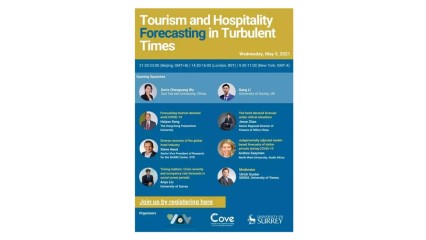
Wednesday, May 5, 2021
Co-organised by
- Tourism and Hospitality Section, International Institute of Forecasters
- Centre for Competitiveness of the Visitor Economy, University of Surrey.
Speeches
- Opening speeches
- Prof Doris Chenguang Wu, Sun Yat-sen University (China)
- Prof Gang Li, University of Surrey (UK).
- Speech 1: Forecasting tourism demand amid COVID-19:
- Prof Haiyan Song, The Hong Polytechnic University.
- Speech 2: The hotel demand forecast under critical situations:
- Jesse Zhao, Senior Regional Director of Finance of Hilton China.
- Speech 3: Judgementally adjusted model-based forecasts of visitor arrivals during COVID-19:
- Prof Andrea Saayman, North-West University (NWU), South Africa.
- Speech 4: Diverse recovery of the global hotel industry:
- Steve Hood, Senior Vice President of Research for the SHARE
Center, STR.
- Steve Hood, Senior Vice President of Research for the SHARE
- Speech 5: Timing matters: Crisis severity and occupancy rate forecasts in social unrest periods:
- Anyu Liu, Senior Lecturer, University of Surrey.
Moderator: Ulrich Gunter, Associate Professor MODUL University of Vienna.

Thursday, 29 April 2021
Organised by
The International Association for Tourism Economics (IATE).
Supported by
Centre for Competitiveness of the Visitor Economy (COVE) of the University of Surrey.
Overview
The ongoing COVID-19 pandemic has had a profound effect on the tourism industry. When the tourist market will recover remains unknown. Accurate forecasting of the full scale of the impact on the tourism industry and market recovery is critical for strategic planning by tourist destinations and tourism-related businesses.
Against this background, the Curated Collection of Annals of Tourism Research on Tourism Forecasting called for a tourism forecasting competition in July 2020. Nineteen researchers, most of them are members of the International Association for Tourism Economics (IATE) from around the world expressed interest and formed three competing teams: Asia Pacific, Europe, and Africa.
Their reports on the forecasting results are published in a special collection of the Curated Collection of Tourism Demand Forecasting of the Annals of Tourism Research.
The purpose of this webinar is to disseminate the forecasting competition results with a view to encouraging further research on tourism demand forecasting during major crises. Three participating teams will present the forecasting methods used and results obtained in the forecasting completion.
Programme
Moderator: Haiyan Song, The Hong Kong Polytechnic University, Hong Kong SAR
09:00-09:10am: Introduction to the Tourism Forecasting Competition Exercise
Gang Li: University of Surrey, UK
09:10-09:30am: Perspective of the Africa Team
Andrea Saayman: North-West University, South Africa
Nikolaos Kourentzes: Skövde University, Sweden
09:30-09:50am: Perspective of the Asia and Pacific Team
Doris Wu: Sun Yat-sen University, China
Richard Qiu: University of Macau, Macau SAR
09:50-10:10am: Perspective of the Europe Team
Laura Vici: University of Bologna, Italy
Vicente Ramos: University of the Balearic Islands, Spain
10:10-10:30am: Q&A
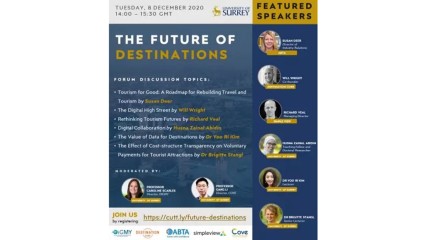
As the coronavirus pandemic continues to have devastating impacts on destinations, governments and destinations have taken action to restore and invigorate the sector. This seminar drawing upon industry and academic insights aimed to consider what the impacts of the pandemic have been and how destinations are able to reposition visitor experiences during times of continued uncertainty whilst planning for the future.
Our panel of distinguished industry speakers included:
- Susan Deer, Director of Industry Relations, ABTA
- Richard Veal, MD, SimpleView
- Will Wright, co-founder, Destination Core.
Our panel of Surrey academic speakers included:
- Yoo Ri Kim
- Brigitte Stangl
- Husna Zainal Abidin.
This webinar was hosted by the EU-funded project WomENt and the University of Surrey’s School of Hospitality and Tourism Management: specifically our Centre for Competitiveness of the Visitor Economy (COVE) and the Centre for Sustainability and Wellbeing in the Visitor Economy (SWELL).
This brought together academics and entrepreneurs from the tourism industry to discuss the changing and increasingly pressing gender and entrepreneurship research agenda:
- Setting the scene: Women and Entrepreneurship in Tourism. Dr Cristina Figueroa Domecq. University of Surrey.
- Female entrepreneurship in the COVID-19 era. Alessandra Alonso. Founder & CEO. Women in Travel.
- Women, technology and entrepreneurship. Patricia Gonzalez. Founder and CEO. Alterhome.
- Re-evaluating the benefits of women's entrepreneurship: Is it time to reconsider? Prof. Susan Marlow. University of Nottingham.
- A Feminist Research Agenda in Tourism. Dr Ana Maria Munar. Copenhagen Business School.
- MODERATED by Prof. Allan Williams. Chair of Tourism and Mobility Studies. University of Surrey.
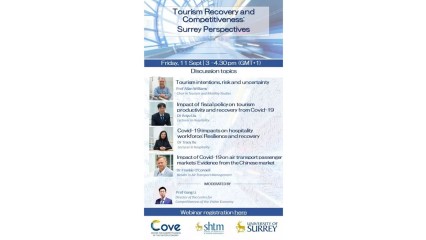
Our Centre hosted on Friday 11 September 2020 the Webinar: “Tourism Recovery and Competitiveness: Surrey Perspectives”, to share with international academics and students our research on the impact of Covid-19 on the hospitality and tourism sector and possible pathways to tourism recovery. The topics covered included:
- Tourism intentions, risk and uncertainty
- Impact of fiscal policy on tourism productivity and recovery
- Impacts on hospitality workforce: Resilience and recovery
- Impact on air transport passenger markets: Evidence from the Chinese market.
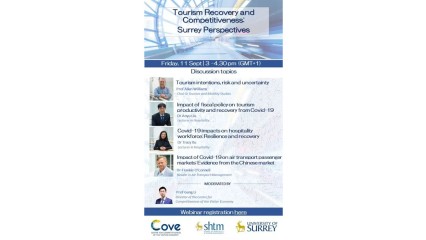
Our Centre jointly organised the above webinar with the U.S.-Asia Center for Tourism and Hospitality Research at Temple University and on the 4 August. Four internationally-recognised scholars:
- Dr Yang Yang from Temple University
- Dr Frankie O’Connell from the University of Surrey
- Prof Nicolas Peypoch from the University of Perpignan
- Dr Bozana Zekan from Modul University Vienna.
Shared their research experiences with over 230 attendees on Zoom. The webinar was broadcasted live on YouTube as well. It was co-moderated by Prof Gang Li, Director of CoVE and Prof Robert Li from Temple University.
The recorded webinar video and presentation slides of the speakers are available from Temple University’s U.S.-Asia Center for Tourism and Hospitality Research’s website: under 'past events.'
Find an expert

Professor Gang Li
Director of the Centre
Researchers

Dr Jason Chen
Associate Professor in Tourism and Events Management, Director of Postgraduate Research

Professor Anita Eves
Professor of Hospitality Management

Dr Marion Karl
Senior Lecturer in Tourism Marketing and Management

Dr Bora Kim
Deputy Head of SHTM (Education), Director of Studies; Senior Lecturer in Hospitality Management

Professor Albert Kimbu
Professor of Sustainability in Business, Co-Director Centre for Sustainability and Wellbeing in the Visitor Economy

Dr Yanning Li
Senior Lecturer (Assistant Professor) Events, Organisations and Operations
Professor Emily Ma
Professor

Dr Frankie O'Connell
Reader in Air Transport Management

Dr Sumeetra Ramakrishnan
Associate Professor

Dr Isabel Rodriguez
Senior Lecturer

Dr Brigitte Stangl
Senior Lecturer in Tourism, Director of the Centre for Digital Transformation in the Visitor Economy

Dr Lorna Wang
Associate Professor in Marketing and Revenue Management/Co-Director, Centre for Research on Ageing and Generations

Professor Allan Williams
Chair in Tourism and Mobility Studies

Dr Tracy Xu
Associate Professor in Future of Work; Co-Director of Future of Work Research Centre
Surrey affiliated members

Dr Irem Bozbay
Senior Lecturer in Economics

Dr Cristina Figueroa Domecq
Universidad Rey Juan Carlos I

Professor Ying Zhou
Professor of Human Resource Management; Director of the Future of Work Research Centre
Postgraduate research students

Marietta Fragkogianni
Postgraduate Research Student

Kevin Li
PhD Researcher

Batilda Moshy
PhD Researcher

Sandro Rero
Postgraduate Research Student

Darina Svobodova
PhD Researcher

Sofie Voss
Postgraduate Researcher

Yiqi Wang
Postgraduate Research Student

Sean Wang
Postgraduate Research Student

Qi Zhang
Postgraduate Research Student
